THE MESSENGER

November 1920



November 1920

E . B. WILLINGHAM, '2L _____________________________Editor-in-Chief
K. E. BURKE, '21 -------------------------------~-----Assistant Editor W. R. LOVING, '2L ________________________________Business Manager
0. L. HITE, ' 22____________________________Assistant Business Manager
Mu Sigma Rho
P. H. DAVIS
M. L. SKAGGS
B. U . DAVENPORT

Philologian
W E. HATCHER, JR. R. F. EDWARDS C. W. NEWTON
THE MESSENGER (founded 1878; named for the Southern Literary Messenger) is published on the 15th of each month from October to May, inclusive, by the PHILOLOGIAN and MU SIGMA RHO Literary Societies, in conjunction with the students of Westhampton College. Its aim is to foster literary composition in the college, and contributions are solicited from all students, whether society members or not. A JOINT WRITER'S MEDAL, valued at twenty-five dollars, will be given by the two societies to the writer of the best article appearing in THE MESSENGER during the year.
All contributions should be handed to the department editors or the Editor-in-Chief by the 1st of the month preceding. Business communications and subscriptions should be directed to the Business Manager and Assistant Business Manager, respectively
Address-
THE MESSENGER, Richmond College, Va.

Every college and university has its customs, traditions and history. One will point with pride to some alumnus who has achieved fame and reflected honor upon Know Thyself his Alma Mater, another will speak of its age and long years of service, while another will glory in its buildings and campus. It is the duty of every man entering college to become acquainted with the institution which he has chosen for his academic home and to acquire all the knowledge possible concerning it. Not only will this increase his range of knowledge, but it will also enable him to understand better and co-operate more fully with current plans of the administration.
In line with this idea THE MESSENGERhopes to be able to clear up some of the haziness which exists in the minds of many students regarding the oil paintings and busts which adorn the walls of the chapel and cafeteria of Richmond College. The men whose likenesses have been preserved in this manner have done something worthy of remembrance either in the growth and development of Richmond College or the Baptist denomination. Beginning with this issue there will appear each month a short sketch of several of these college fathers. Socrates said "Know thyself." Let this apply to our university and know it from every angle, both past and present. Become acquainted with those who have gone before and let their examples serve as inspirations in the mapping out of our careers.

As this, the second issue of THE MESSENGERappears, we wonder how it will be received by the students. We watched with interest those students who received the first issue. Some took it eagerly, others Needed an mechanically, and some because they had Introduction signed a subscription blank. Others, -even though they had subscribed, were interested in something else at the time of the appearance of THE MESSENGERand had to be reminded that they owned a copy of it.
It is by these latter that we ;,tre particularly anxious to have these words read. That they have subscribed shows they have at least a bit more interest than the person who will throw away in one week an amount that would be welcomed by the managers of THE MESSENGER in exchange for a subscription. We ask of these less interested persons that they will glance at both the literary articles and the advertisements in our magazine so that they may know what THE MESSENGERis.
Students ---subscribers and non-subscribers ---it will take more than seventeen hundred dollars to publish a creditable literary magazine this year. We expect you to subscribe and contribute articles, but will you be loyal enough to patronize those who advertise with us so long as they serve you satisfactorily? It is upon those who advertise with us that we are dependent for the publication of THE MESSENGER.When you patronize them tell them you are from the University. Let THE MESSENGER introduce you. Be friends. Shake! W. R. L.
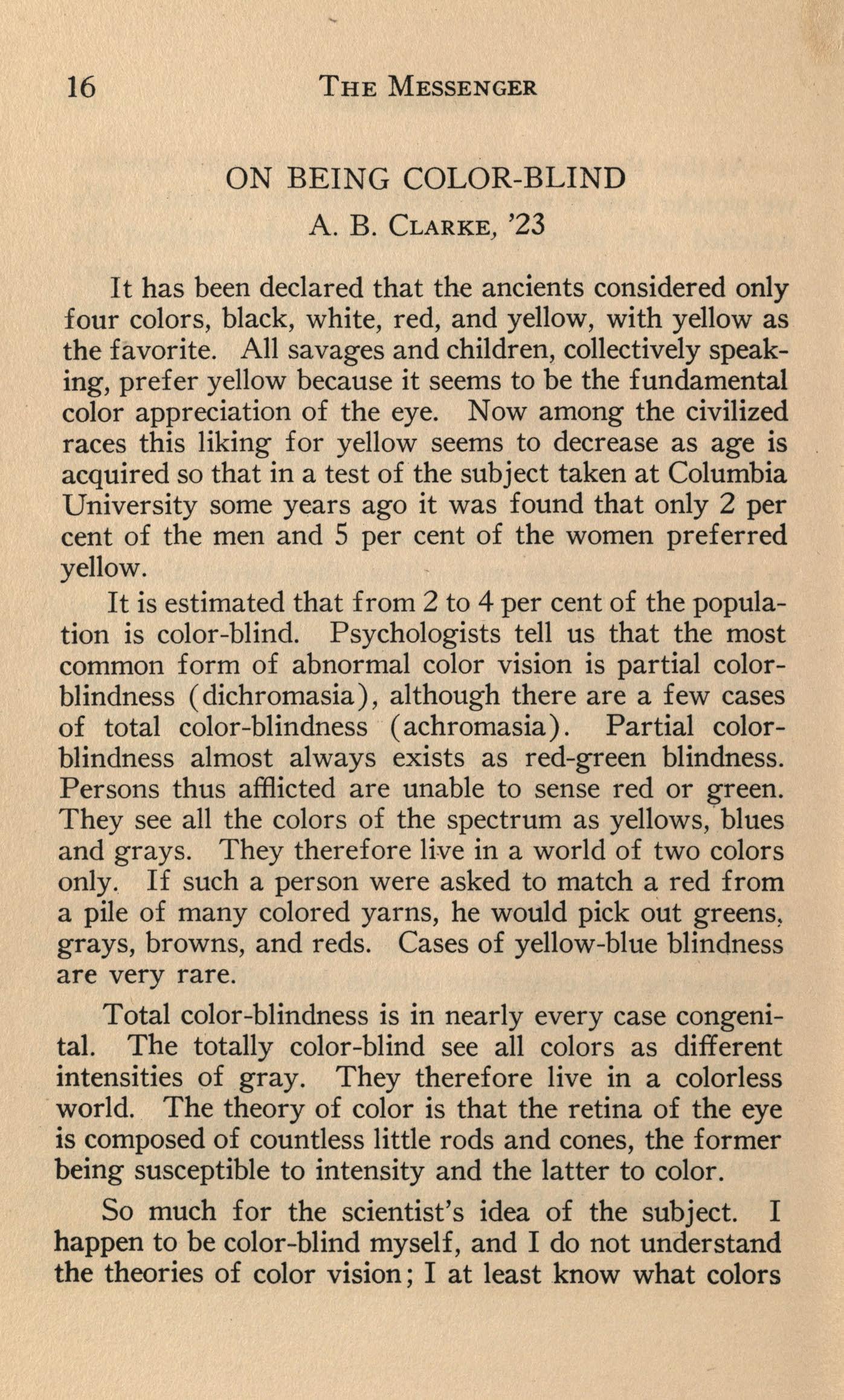
It has been declared that the ancients considered only four colors, black, white, red, and yellow, with yellow as the favorite. All savages and children, collectively speaking, prefer yellow because it seems to be the fundamental color appreciation of the eye. Now among the civilized races this liking for yellow seems to decrease as age is acquired so that in a test of the subject taken at Columbia University some years ago it was found that only 2 per cent of the men and 5 per cent of the women preferred yellow.
It is estimated that from 2 to 4 per cent of the population is color-blind. Psychologists tell us that the most common form of abnormal color vision is partial colorblindness ( dichromasia), although there are a few cases of total color-blindness ( achromasia). Partial colorblindness almost always exists as red-green blindness. Persons thus afflicted are unable to sense red or green. They see all the colors of the spectrum as yellows,' blues and grays. They therefore live in a world of two colors only. If such a person were asked to match a red from a pile of many colored yarns, he would pick out greens , grays, browns, and reds. Cases of yellow-blue blindness are very rare.
Total color -blindness is in nearly every case congenital. The totally color-blind see all colors as different intensities of gray. They therefore live in a colorless world. The theory of color is that the retina of the eye is composed of countless little rods and cones, the former being susceptible to intensity and the latter to color.
So much for the scientist's idea of the subject. I happen to be color-blind myself, and I do not understand the theories of color vision; I at least know what colors

look like, or do not look like, to me. In beginning a discussion of the subject, it might be of interest to know that three sons of three sisters in my family are colorblind, while none of the many ( too many, in fact!) girls are so affected. And it has always been one of the family jokes how these three first cousins confuse colors.
First, I should like to explain just what color-blindness means to me. My trouble is not pure dichromasia, for I see all colors, but I cannot distinguish them. I can only see one shade of each color. When I see or hear the word "red" mentioned, I think only of one shade of red: that of blood; it is the same with other colors. Blue to me is the color of the sky; green, that of the grass, a brilliant green; yellow, that of a canary. All other colors become shades of those just named. Brown and a dark, dingy red are the same, purple and dark blue are alike, lavender, pink, and light blue have no distinction in my eye, and even red, such as that of roses, is my conception of purple.
Color-blindness is inconve~ient in many ways. Not long ago in the chemistry laboratory I was told to place a few drops of a solution of sodium hydroxide on red litmus paper and note the effect. I knew the litmus paper was red because it was called that, but it looked a dark gray to me. After placing the sodium hydroxide on the paper I noticed the color changed to purple. Imagine my chagrin upon finding that the change was blue on the red paper, after telling Dr. Ryland that the change was purple on gray paper! Nor is that the only time I have had to make lengthy explanations upon my inability to distinguish colors. Often I have been told to look for a green book in a library and have seen dozens of such books which were really red or brown, or have attempted to describe some object by its color and have failed miserably. Once I attended a party which had as its color scheme, so I was told, blue and pink; I saw only one color! All colors harmonize in my sight. Of course, I have
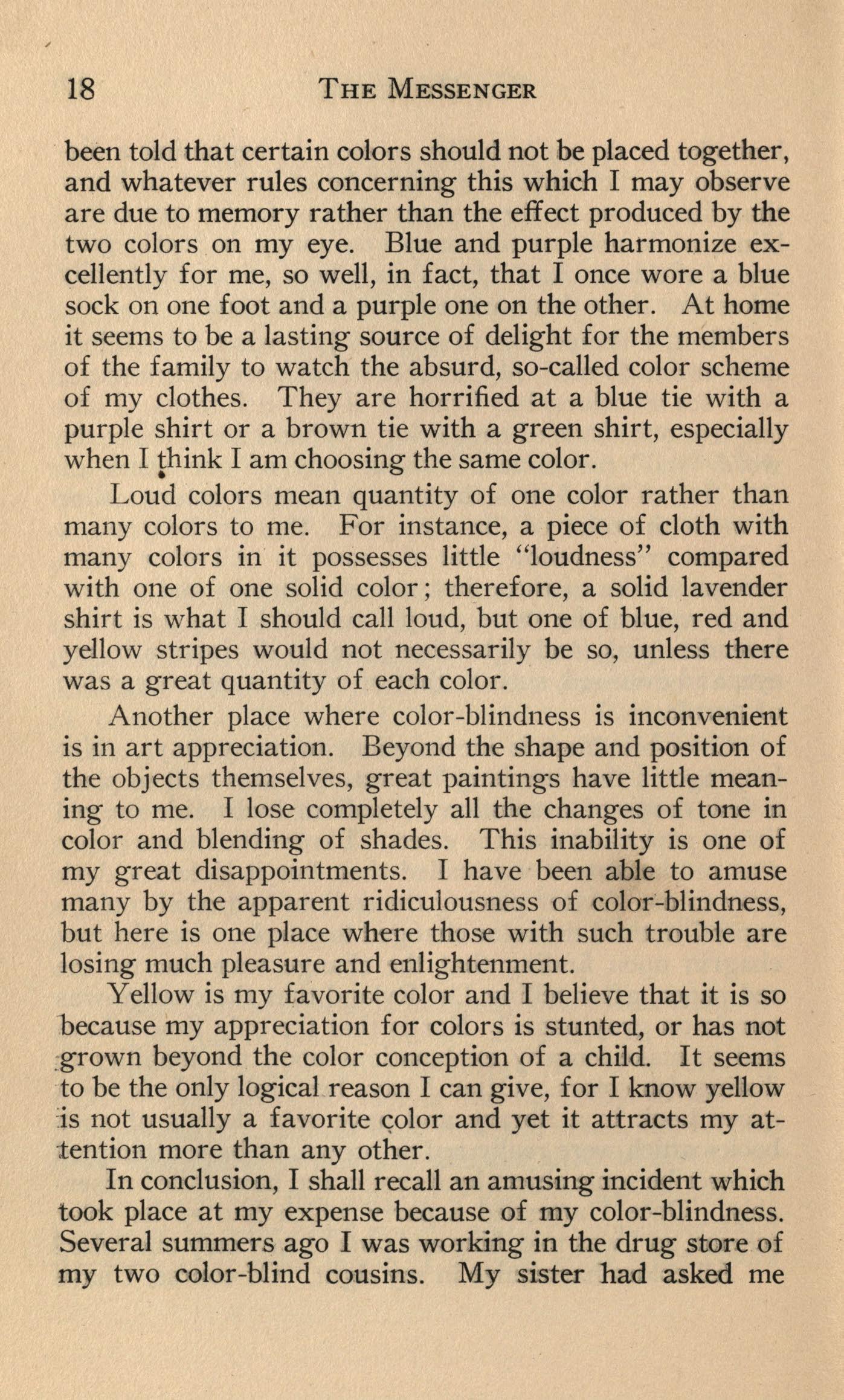
been told that certain colors should not be placed together, and whatever rules concerning this which I may observe are due to memory rather than the effect produced by the two colors on my eye. Blue and purple harmonize excellently for me, so well, in fact, that I once wore a blue sock on one foot and a purple one on the other. At home it seems to be a lasting source of delight for the members of the family to watch the absurd, so-called color scheme of my clothes. They are horrified at a blue tie with a purple shirt or a brown tie with a green shirt, especially when I think I am choosing the same color.
Loud colors mean quantity of one color rather than many colors to me. For instance, a piece of cloth with many colors in it possesses little "loudness" compared with one of one solid color; therefore, a solid lavender shirt is what I should call loud, but one of blue, red and yellow stripes would not necessarily be so, unless there was a great quantity of each color.
Another place where color-blindness is inconvenient is in art appreciation. Beyond the shape and position of the objects themselves, great paintings have little meaning to me. I lose completely all the changes of tone in color and blending of shades. This inability is one of my great disappointments. I have been able to amuse many by the apparent ridiculousness of color-blindness, but here is one place where those with such trouble are losing much pleasure and enlightenment.
Yellow is my favorite color and I believe that it is so because my appreciation for colors is stunted, or has not :grown beyond the color conception of a child. It seems to be the only logical reason I can give, for I know yellow =isnot usually a favorite c;olor and yet it attracts my attention more than any other.
In conclusion, I shall recall an amusing incident which took place at my expense because of my color-blindness. Several summers ago I was working in the drug store of my two color-blind cousins. My sister had asked me
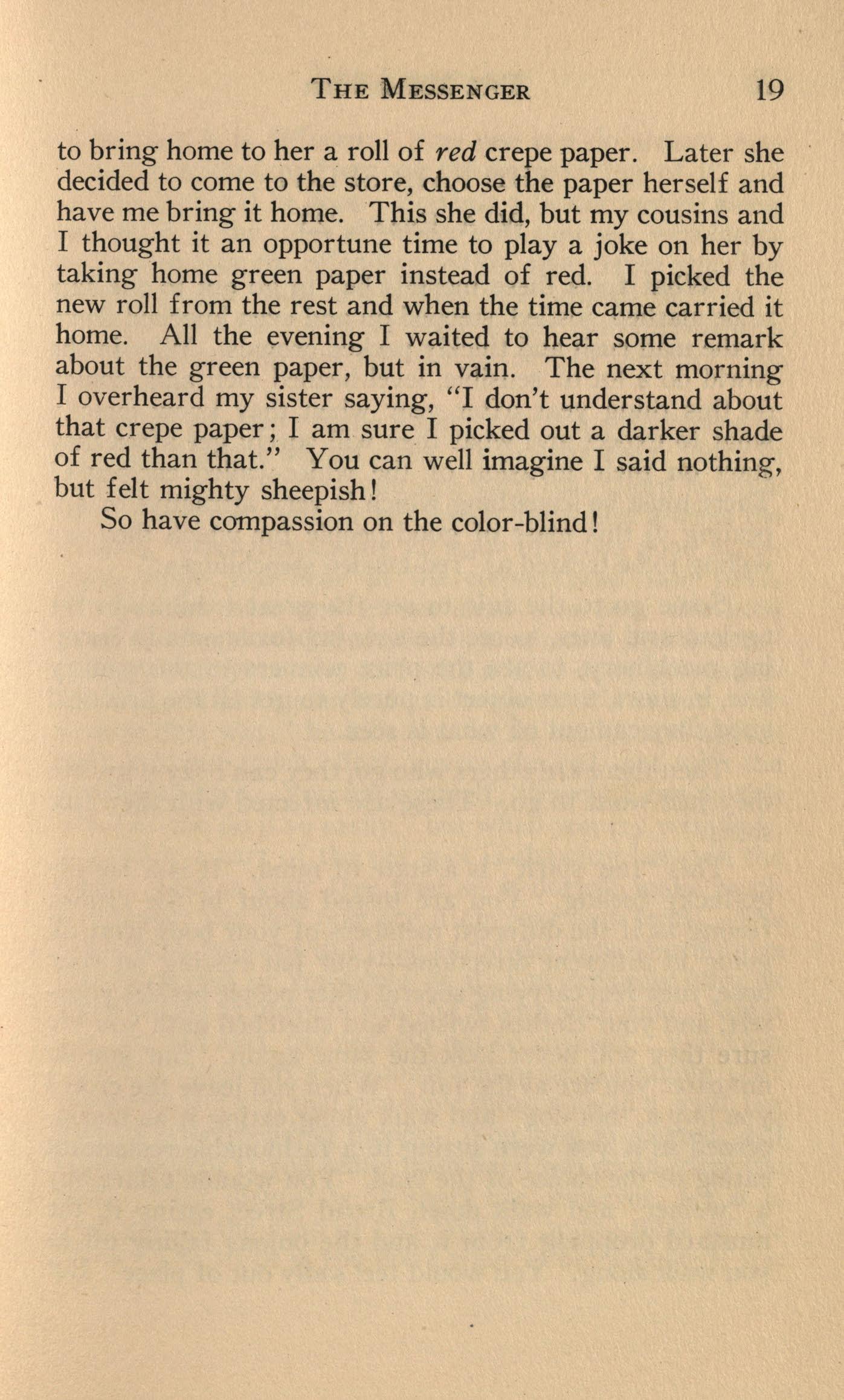
to bring home to her a roll of red crepe paper. Later she decided to come to the store, choose the paper herself and have me bring it home. This she did, but my cousins and I thought it an opportune time to play a joke on her by taking home green paper instead of red. I picked the new roll from the rest and when the time came carried it home. All the evening I waited to hear some remark about the green paper, but in vain. The next morning I overheard my sister saying, "I don't understand about that crepe paper; I am sure I picked out a darker shade of red than that." You can well imagine I said nothing, but felt mighty sheepish!
So have compassion on the color-blind!

"What fools these mortals be" to go out to the fair to be mashed, jostled, stepped on and even knocked down in the mad rush and thickly packed crowds. Why in the world do a lot of sensible, level-headed men and women do this thing year after year when they know exactly what to expect and what ·they will surely get after they start on their invasion of the white-walled enclosure? There must be something which is very attractive or appealing to this mass of good people for which they are willing to be treated as "red-headed stepchildren."
Some go to the fair to see the great exhibits in the agricultural lines, to see the new improvements in farming machinery, to see the prize winners in the poultry line, in short, their object is purely to get all the practical good they can out of what is seen.
Then there are others who go, they can't say why, but they just want to go. These are infected with the "fair spirit."
This "fair spirit" is a state of mind. It is a happygo-lucky feeling. You are tossed about in the crowd, feeling as if the different members of your body were all going in different directions---your hat resting on your nose, your feet carrying several other people besides yourself, and your clothes twisted and stretched until you are sure they will never look the same again. But you do not care; you are at the fair. When you leave the crowd you buy a "hot dog" and walk along eating it as unconcerned as if you were sitting in a fashionable restaurant eating of the choice of the land. You wouldn't dare buy a "weiner" and walk down Broad Street eating it, the mustard dropping from it and the onions falling off as you walk along. You would feel sadly out of place. But
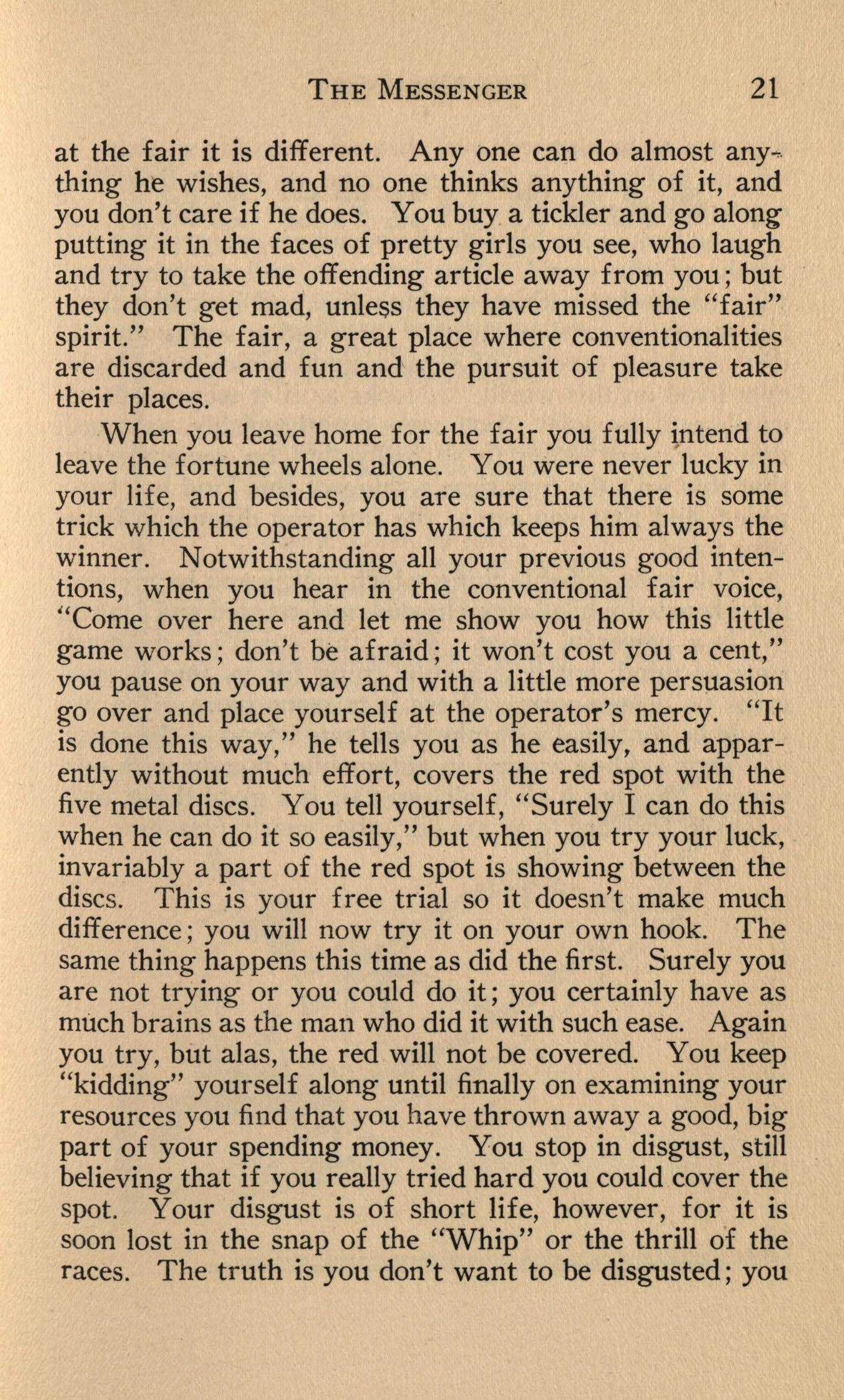
at the fair it is different. Any one can do almost any~thing he wishes, and no one thinks anything of it, and you don't care if he does. You buy a tickler and go along putting it in the faces of pretty girls you see, who laugh and try to take the offending article away from you; but they don't get mad, unle!)s they have missed the "fair" spirit." The fair, a great place where conventionalities are discarded and fun and the pursuit of pleasure take their places.
When you leave home for the fair you fully intend to leave the fortune wheels alone. You were never lucky in your life, and besides, you are sure that there is some trick which the operator has which keeps him always the winner. Notwithstanding all your previous good intentions, when you hear in the conventional fair voice, "Come over here and let me show you how this little game works; don't be afraid; it won't cost you a cent," you pause on your way and with a little more persuasion go over and place yourself at the operator's mercy. "It is done this way," he tells you as he easily, and apparently without much effort, covers the red spot with the five metal discs. You tell yourself, "Surely I can do this when he can do it so easily," but when you try your luck, invariably a part of the red spot is showing between the discs. This is your free trial so it doesn't make much difference; you will now try it on your own hook. The same thing happens this time as did the first. Surely you are not trying or you could do it; you certainly have as much brains as the man who did it with such ease. Again you try, but alas, the red will not be covered. You keep "kidding" yourself along until finally on examining your resources you find that you have thrown away a good, big part of your spending money. You stop in disgust, still believing that if you really tried hard you could cover the spot. Your disgust is of short life, however, for it is soon lost in the snap of the "Whip" or the thrill of the races. The truth is you don't want to be disgusted; you
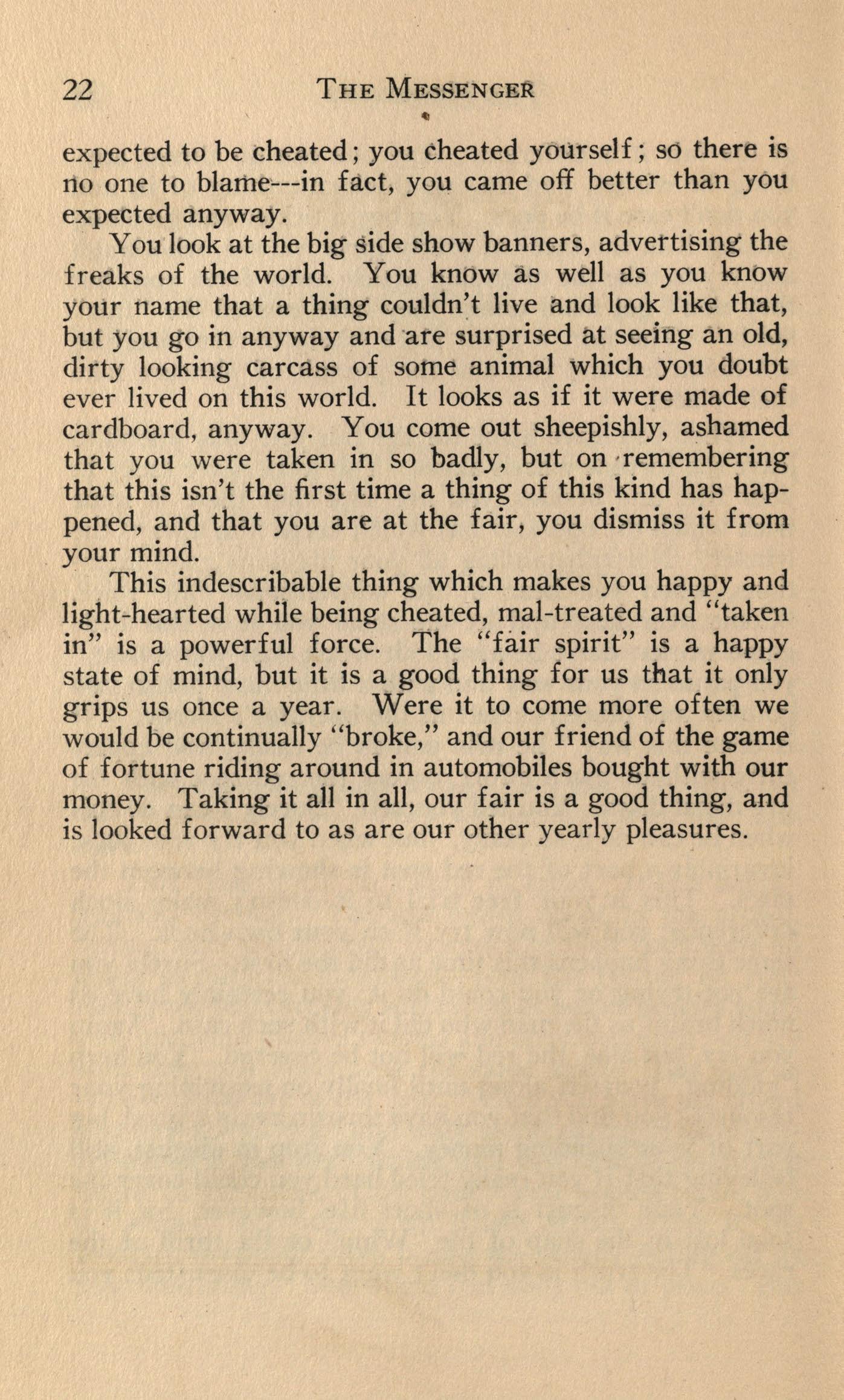
..
expected to be cheated; you cheated yourself ; so there is no one to blame----in fact, you came off better than you expected anyway.
You look at the big side show banners, advertising the freaks of the world. You know as well as you know your name that a thing couldn'.t live and look like that, but you go in anyway and are surprised at seeing an old, dirty looking carcass of some animal which you doubt ever lived on this world. It looks as if it were made of cardboard , anyway. You come out sheepishly, ashamed that you were taken in so badly, but on ·remembering that this isn't the first time a thing of this kind has happened, and that you are at the fair, you dismiss it from your mind.
This indescribable thing which makes you happy and light-hearted while being cheated, mal-treated and "taken in" is a powerful force. The "fair spirit" is a happy state of mind, but it is a good thing for us that it only grips us once a year. Were it to come more often we would be continually "broke," and our friend of the game of fortune riding around in automobiles bought with our money . Taking it all in all, our fair is a good thing, and i s looked forward to as are our other yearly pleasures.

When all else in the world has grown stale, And pleasure in life needs a goad; The one cure that never can fail ls the lure of the open road.
To wander at your own free will, With a comrade that understands; To flee from all that brings ill ls all that the soul demands;
To travel the far, far places, All strands, all countries and climes, To meet and know thousands of faces: The best anodyne of all times.
To, go when the spirit is moving, To follow the star that's our lode; The thing that makes life worth the living, ls the lure of the open road.
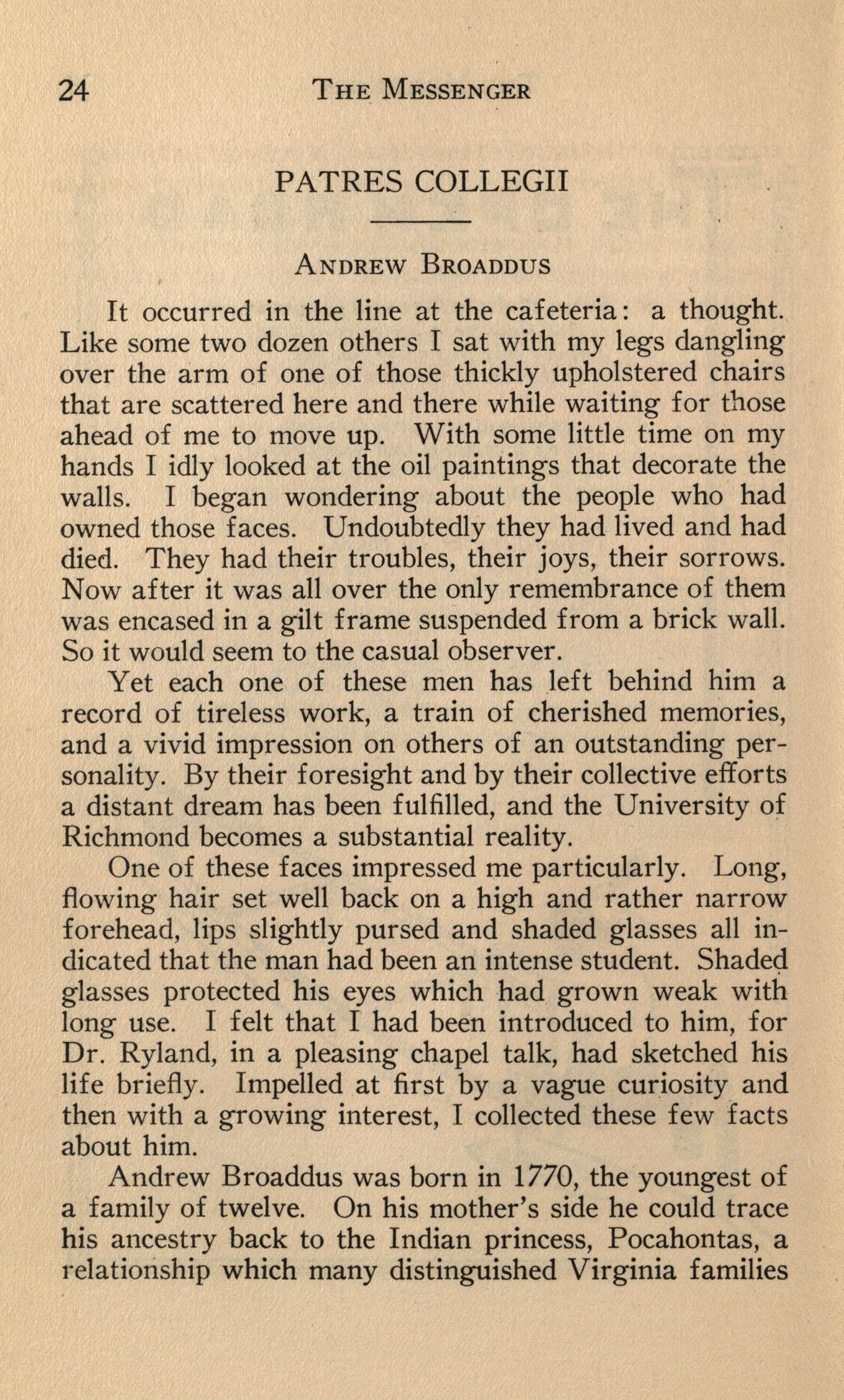
ANDREW BROADDUS
It occurred in the line at the cafeteria: a thought. Like some two dozen others I sat with my legs dangling over the arm of one of those thickly upholstered chairs that are scattered here and there while waiting for those ahead of me to move up. With some little time on my hands I idly looked at the oil paintings that decorate the walls. I began wondering about the people who had owned those faces. Undoubtedly they had lived and had died. They had their troubles, their joys, their sorrows. Now after it was all over the only remembrance of them was encased in a gilt frame suspended from a brick wall. So it would seem to the casual observer.
Yet each one of these men has left behind him a record of tireless work, a train of cherished memories, and a vivid impression on others of an outstanding personality. By their foresight and by their collective efforts a distant dream has been fulfilled, and the University of Richmond becomes a substantial reality.
One of these faces impressed me particularly. Long, flowing hair set well back on a high and rather narrow forehead, lips slightly pursed and shaded glasses all indicated that the man had been an intense student. Shade~ glasses protected his eyes which had grown weak with long use. I felt that I had been introduced to him, for Dr . Ryland, in a pleasing chapel talk, had sketched his life briefly. Impelled at first by a vague curiosity and then with a growing interest, I collected these few facts about him.
Andrew Broaddus was born in 1770, the youngest of a family of twelve. On his mother's side he could trace his ancestry back to the Indian princess, Pocahontas, a relatioriship which many distinguished Virginia families
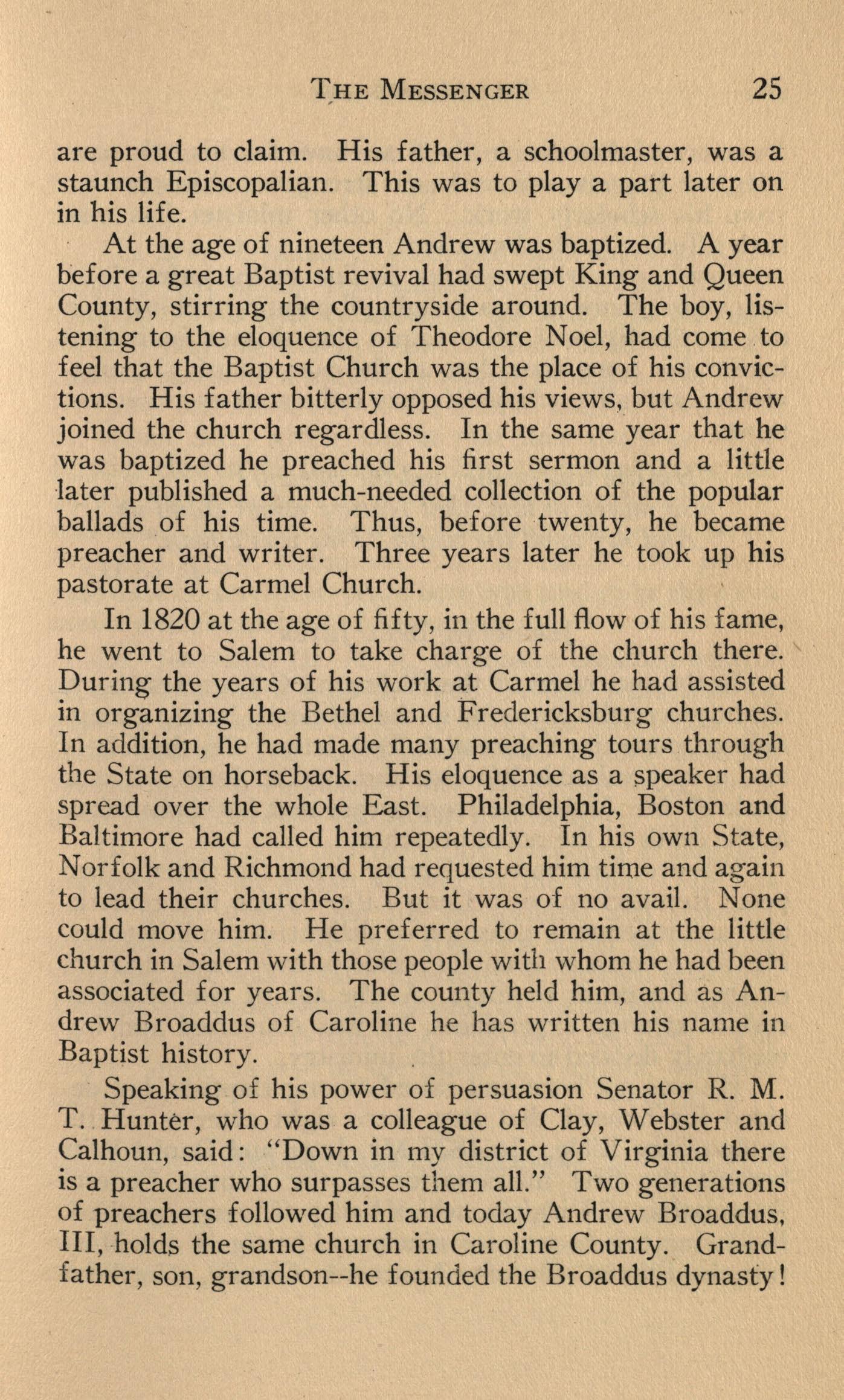
are proud to claim. His father, a schoolmaster, was a staunch Episcopalian. This was to play a part later on in his life.
At the age of nineteen Andrew was baptized. A year before a great Baptist revival had swept King and Queen County, stirring the countryside around. The boy, listening to the eloquence of Theodore Noel, had come .to feel that the Baptist Church was the place of his convictions. His father bitterly opposed his views, but Andrew joined the church regardless. In the same year that he was baptized he preached his first sermon and a little later published a much-needed collection of the popular ballads of his time. Thus, before twenty, he became preacher and writer. Three years later he took up his pastorate at Carmel Church.
In 1820 at the age of fifty, in the full flow of his fame, he went to Salem to take charge of the church there. During the years of his work at Carmel he had assisted in organizing the Bethel and Fredericksburg churches. In addition, he had made many preaching tours through the State on horseback. His eloquence as a speaker had spread over the whole East. Philadelphia, Boston and Baltimore had called him repeatedly. In his own State, Nor folk and Richmond had requested him time and again to lead their churches. But it was of no avail. None could move him. He pref erred to remain at the little church in Salem with those people with whom he had been associated for years. The county held him, and as Andrew Broaddus of Caroline he has written his name in Baptist history.
Speaking of his power of persuasion Senator R. M. T. Hunter, who was a colleague of Clay, Webster and Calhoun, said: "Down in my district of Virginia there is a preacher who surpasses them all." Two generations of preachers followed him and today Andrew Broaddus, III, holds the same church in Caroline County. Grandfather, son, grandson--he founded the Broaddus dynasty!
Numbers of churches in the State have felt his influence. Virginia Baptists received new strength and inspiration from his scholarly work. No other minister has won such affection and admiration.
So if now, while waiting in line at the cafeteria, I happen to glance up at a certain oil painting I think of it not as the likeness of a vague, far distant individual buried for some time, but as the portrait of a strong, virile personality whose life has influenced even current times.
"His life was gentle, and the elements So mixed in him, that Nature might stand up, And say to all the world, 'This was a man!'))
-B.V.D.
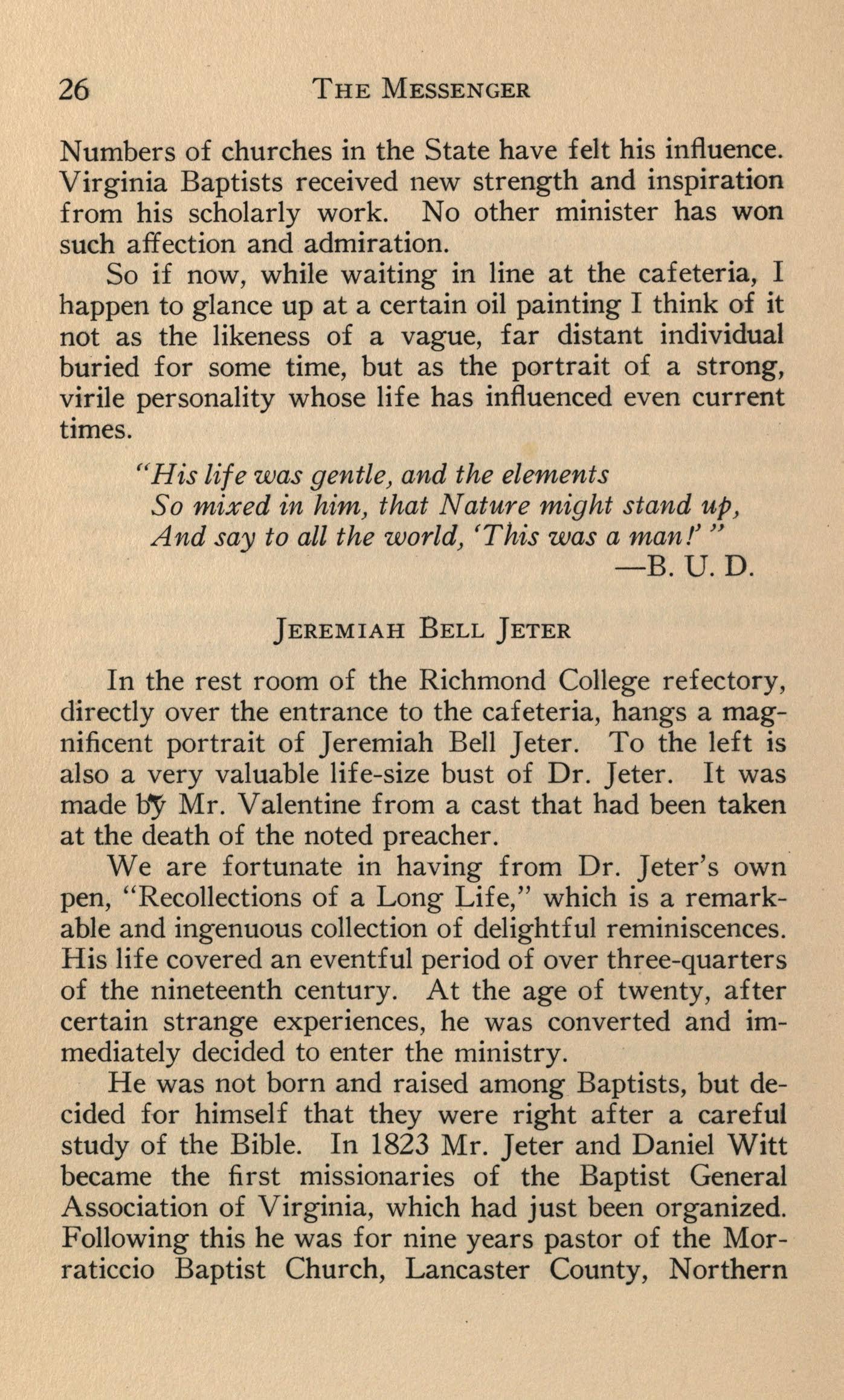
JEREMIAH BELL JETER
In the rest room of the Richmond College refectory, directly over the entrance to the cafeteria, hangs a magnificent portrait of Jeremiah Bell Jeter. To the left is also a very valuable life-size bust of Dr. Jeter. It was made bJ Mr. Valentine from a cast that had been taken at the death of the noted preacher.
We are fortunate in having from Dr. Jeter's own pen, "Recollections of a Long Life," which is a remarkable and ingenuous collection of delightful reminiscences. His life covered an eventful period of over three-quarters of the nineteenth century. At the age of twenty, after certain strange experiences, he was converted and immediately decided to enter the ministry.
He was not born and raised among Baptists, but decided for himself that they were right after a careful study of the Bible. In 1823 Mr. Jeter and Daniel Witt became the first missionaries of the Baptist General Association of Virginia, which had just been organized. Following this he was for nine years pastor of the Morraticcio Baptist Church, Lancaster County, Northern
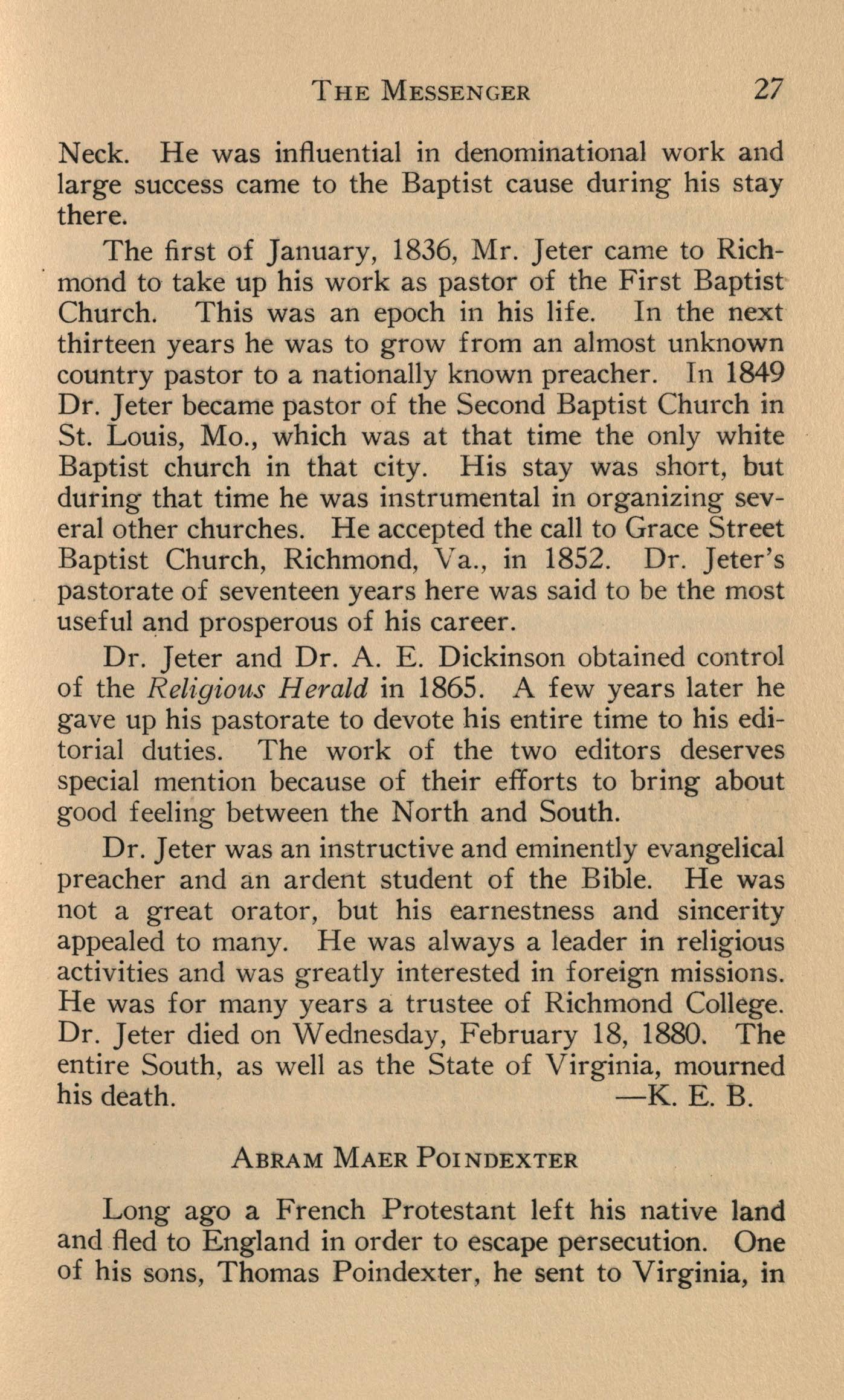
Neck. He was influential in denominational work and large success came to the Baptist cause during his stay there.
The first of January, 1836, Mr. Jeter came to Rich. mond to take up his work as pastor of the First Baptist Church. This was an epoch in his life. In the next thirteen years he was to grow from an almost unknown country pastor to a nationally known preacher. In 1849 Dr . Jeter became pastor of the Second Baptist Church in St. Louis, Mo., which was at that time the only white Baptist church in that city. His stay was short, but during that time he was instrumental in organizing several other churches. He accepted the call to Grace Street Baptist Church, Richmond, V a., in 1852. Dr. Jeter's pastorate of seventeen years here was said to be the mo st useful and prosperous of his career.
Dr. Jeter and Dr. A. E. Dickinson obtained control of the Religious Herald in 1865. A few years later he gave up his pastorate to devote his entire time to his editorial duties. The work of the two editors deserves special mention because of their efforts to bring about good feeling between the North and South.
Dr. Jeter was an instructive and eminently evangelical preacher and an ardent student of the Bible. He was not a great orator, but his earnestness and sincerity appealed to many. He was always a leader in religious activities and was greatly interested in foreign missions. He was for many years a trustee of Richmond College. Dr . Jeter died on Wednesday, February 18, 1880. The entire South, as well as the State of Virginia, mourned his death. -K. E . B .
Long ago a French Protestant left his native land and fled to England in order to escape persecution. One of his sons, Thomas Poindexter, he sent to Virginia, in

order to prevent his marriage to a certain young lady whom he considered an undesirable companion for his son. The young lady, learning of the whereabouts of her lover, followed him up as an indented servant. Young Poindexter, learning that a shipload of indented servants had arrived, went to seek a servant, and found his future wife. A grandson of this couple, Richard Jones Poindexter, became the father of the subject of this sketch. Fannie Maer married Richard Jones Poindexter, becoming the mother of eight children, of whom only one lived to manhood, Abram Maer. Young Poindexter was born September 22, 1809, in North Carolina. Early in his life the boy showed a gift of argumentation, which proved to be one of his distinguishing traits through life. After a discussion with his son, on one occasion, Mr. Poindexter was candid enough to say: "Well, my son, you have cornered me."
At twenty-one years of age Mr. Poindexter entered Columbian College, Washington, D. C. Trouble with his throat came to him now, and bothered him through life. Ill-health caused him to leave college January 20, 1834. On May 25, 1837, he married Mrs. Elija J. Craddock, with whom he spent a happy married life. He accepted a call to Catawba and Charlotte Court House churches; became exceedingly popular, and was regarded as the ablest minister of any denomination in that section. A year later, when he was thirty-six years old, Columbian College conferred upon him the honorary degree of doctor of divinity.
A large part of Dr. Poindexter's life was given to agency work. This field of work was especially adapted to him, and it was here that he showed his wonderful will power, persuasion and oratory. Seeking funds for Richmond College and the Foreign Mission Board, he went far and wide pleading for the two great causes of education and foreign missions. He was one of those
great souls who helped to found the Southern Baptist Theological Seminary.
Dr. Poindexter, though not an alumnus of Richmond College, was vitally interested in the growth of it. In June, 1851, his first agency for Richmond College began and lasted for three ·years. He was so successful in the first attempt, raising about $75,000, that he was asked to raise some more money. He soon brought' in pledges amounting to $25,500, which money was spent in erecting the north wing of the dormitory. His fervid eloquence stirred the people all over the South and caused the enrollment to reach one hundred and sixty-one men in 1855-'56. In the terrible years that followed the Civil War Dr. Poindexter secured in bonds and subscriptions $75,000. This amount was collected at a great sacrifice, for at this time it was almost impossible to raise money for any cause.
In the waiting room of the cafeteria at the University of Richmond one can see a remarkable picture of Dr. Poindexter upon the wall. We especially note the piercing black eyes and the tenderness of his face. Dr. Poindexter died May 7, 1872. In his death Virginia lost one of her noblest men in the fight for liberal education, and Richmond College one of the bravest fighters that ever went out to battle for her.
-C.

W. N.
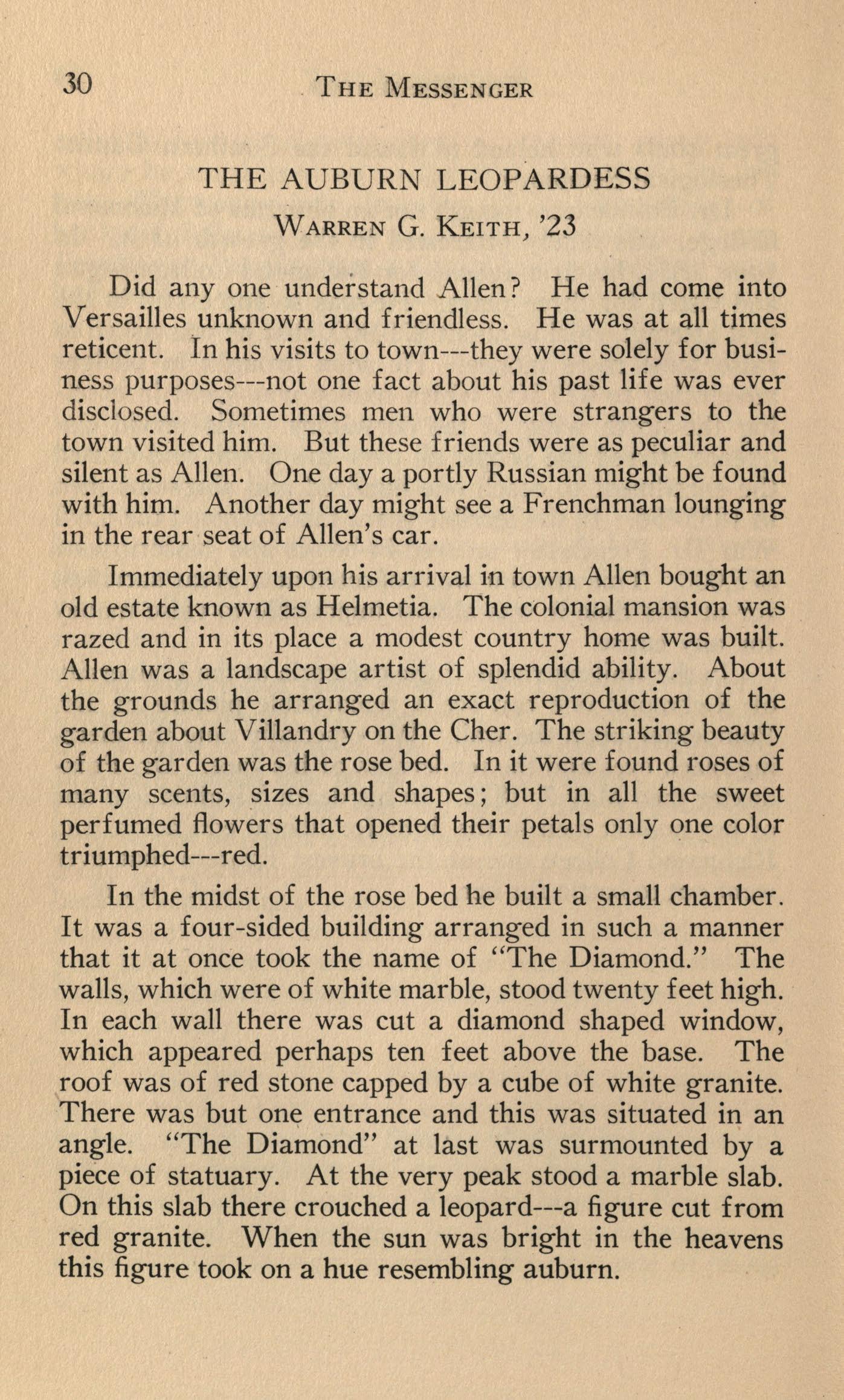
WARREN G. KEITH, '23
Did any one understand Allen? He had come into Versailles unknown and friendless. He was at all times reticent. ln his visits to town---they were solely for business purposes---not one fact about his past life was ever disclosed. Sometimes men who were strangers to the town visited him. But these friends were as peculiar and silent as Allen. One day a portly Russian might be found with him. Another day might see a Frenchman lounging in the rear seat of Allen's car.
Immediately upon his arrival in town Allen bought an old estate known as Helmetia. The colonial mansion was razed and in its place a modest country home was built. Allen was a landscape artist of splendid ability. About the grounds he arranged an exact reproduction of the garden about Villandry on the Cher. The striking beauty of the garden was the rose bed. In it were found roses of many scents, sizes and shapes; but in all the sweet perfumed flowers that opened their petals only one color triumphed---red.
In the midst of the rose bed he built a small chamber. It was a four-sided building arranged in such a manner that it at once took the name of "The Diamond." The walls, which were of white marble, stood twenty feet high. In each wall there was cut a diamond shaped window, which appeared perhaps ten feet above the base. The roof was of red stone capped by a cube of white granite. There was but one entrance and this was situated in an angle. "The Diamond" at last was surmounted by a piece of statuary. At the very peak stood a marble slab. On this slab there crouched a leopard---a figure cut from red granite. When the sun was bright in the heavens this figure took on a hue resembling auburn.

Such an extraordinary construction would naturally cause much conjecture. Allen spoke to no one of its purpose. It was not a chapel. For some time it had been built and never had priest or preacher entered to offer worship. Many people said that it was a secret chamber in which Allen hoped to invent a novel machine. They based their belief on the fact that he was the constant recipient of telegrams, many of them offering him great sums of money. But never did a message name the article so valuable.
Only one story of all those in circulation seemed to spring from a true source, yet it shed little light on the affair. This came from the driver of the mid-night bus. He had been to Hawk to change passengers, and just in front of Helmetia he was detained by an accident. The attendant walked in to town to secure repairs. While the driver awaited the repairs a great light suddenly shot from the diamond-shaped windows. He crept up to the door and peeped inside, but he barely had time to see the form of a big cat. The light snapped out. He heard the rustle of a woman's skirt and a voice seemed to say, "Aid me, aid---," or something like that.
Many weeks passed and nothing further was heard concerning the place. My friend Riggin came to town one day and during a conversation with him he suggested that I ride out to Helmetia with him, as he had some business with Horace Allen. As we drove into the grounds at Helmetia "The Diam ond" shone white and bright in the ~morning sun.
"Poor old fellow," said Riggin, " it is too bad that he is that way, isn't it?"
"Just what do you mean?" I returned to his query "Oh, then you do not know the story about Allen?"
"Is Mr. AHen in?" he inquired of a servant who responded to our ring.
"Mr. Allen cannot see you now, sir,. Would you care to wait for an hour?"
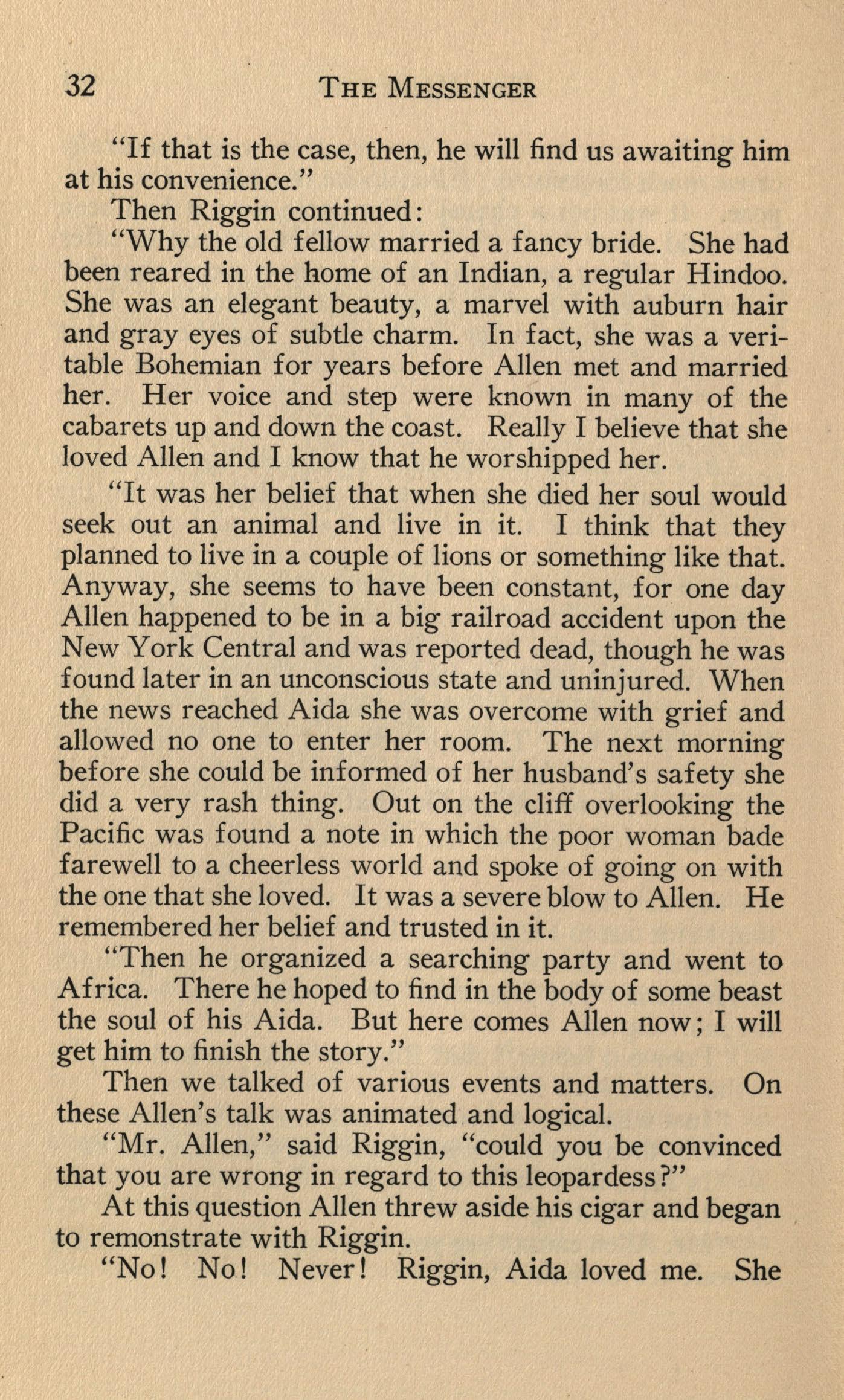
"If that is the case, then, he will find us awaiting him at his convenience."
Then Riggin continued:
"Why the old fell ow married a fancy bride. She had been reared in the home of an Indian, a regular Hindoo. She was an elegant beauty, a marvel with auburn hair and gray eyes of subtle charm. In fact, she was a veritable Bohemian for years before Allen met and married her. Her voice and step were known in many of the cabarets up and down the coast. Really I believe that she loved Allen and I know that he worshipped her.
"It was her belief that when she died her soul would seek out an animal and live in it. I think that they planned to live in a couple of lions or something like that. Anyway, she seems to have been constant, for one day Allen happened to be in a big railroad accident upon the New York Central and was reported dead, though he was found later in an unconscious state and uninjured. When the news reached Aida she was overcome with grief and allowed no one to enter her room. The next morning before she could be informed of her husband's safety she did a very rash thing. Out on the cliff overlooking the Pacific was found a note in which the poor woman bade farewell to a cheerless world and spoke of going on with the one that she loved. It was a severe blow to Allen. He remembered her belief and trusted in it.
"Then he organized a searching party and went to Africa. There he hoped to find in the body of some beast the soul of his Aida. But here comes Allen now; I will get him to finish the story."
Then we talked of various events and matters. On these Allen's talk was animated .and logical.
"Mr. Allen," said Riggin, "could you be convinced that you are wrong in regard to this leopardess?"
At this question Allen threw aside his cigar and began , to remonstrate with Riggin.
"No! No! Never! Riggin, Aida loved me. She
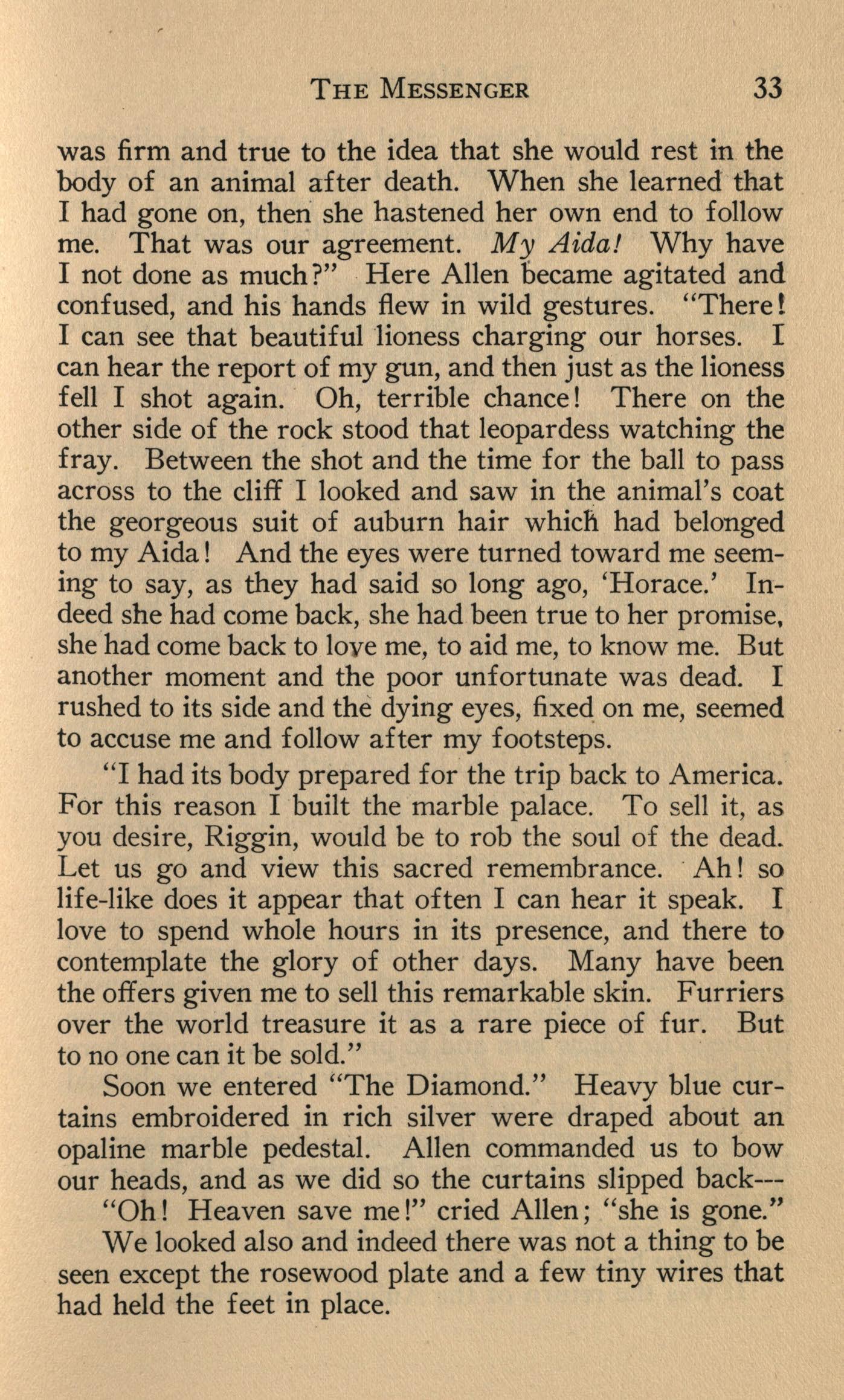
was firm and true to the idea that she would rest in the body of an animal after death. When she learned that I had gone on, then she hastened her own end to follow me. That was our agreement. My Aida! Why have I not done as much?" Here Allen oecame agitated and confused, and his hands flew in wild gestures. "There! I can see that beautiful lioness charging our horses. I can hear the report of my gun, and then just as the lioness fell I shot again. Oh, terrible chance! There on the other side of the rock stood that leopardess watching the fray. Between the shot and the time for the ball to pass across to the cliff I looked and saw in the animal's coat the georgeous suit of auburn hair which had belonged to my Aida! And the eyes were turned toward me seeming to say, as they had said so long ago, 'Horace.' Indeed she had come back, she had been true to her promise, she had come back to love me, to aid me, to know me. But another moment and the poor unfortunate was dead. I rushed to its side and the dying eyes, fixed. on me, seemed to accuse me and follow after my footsteps.
"I had its body prepared for the trip back to America. For this reason I built the marble palace. To sell it, as you desire, Riggin, would be to rob the soul of the dead. Let us go and view this sacred remembrance. · Ah! so life-like does it appear that often I can hear it speak. I love to spend whole hours in its presence, and there to contemplate the glory of other days. Many have been the offers given me to sell this remarkable skin. Furriers over the world treasure it as a rare piece of fur. But to no one can it be sold."
Soon we entered "The Diamond." Heavy blue curtains embroidered in rich silver were draped about an opaline marble pedestal. Allen commanded us to bow our heads, and as we did so the curtains slipped back--"Oh ! Heaven save me!" cried Allen; "she is gone."
We looked also and indeed there was not a thing to be seen except the rosewood plate and a few tiny wires that had held the feet in place.
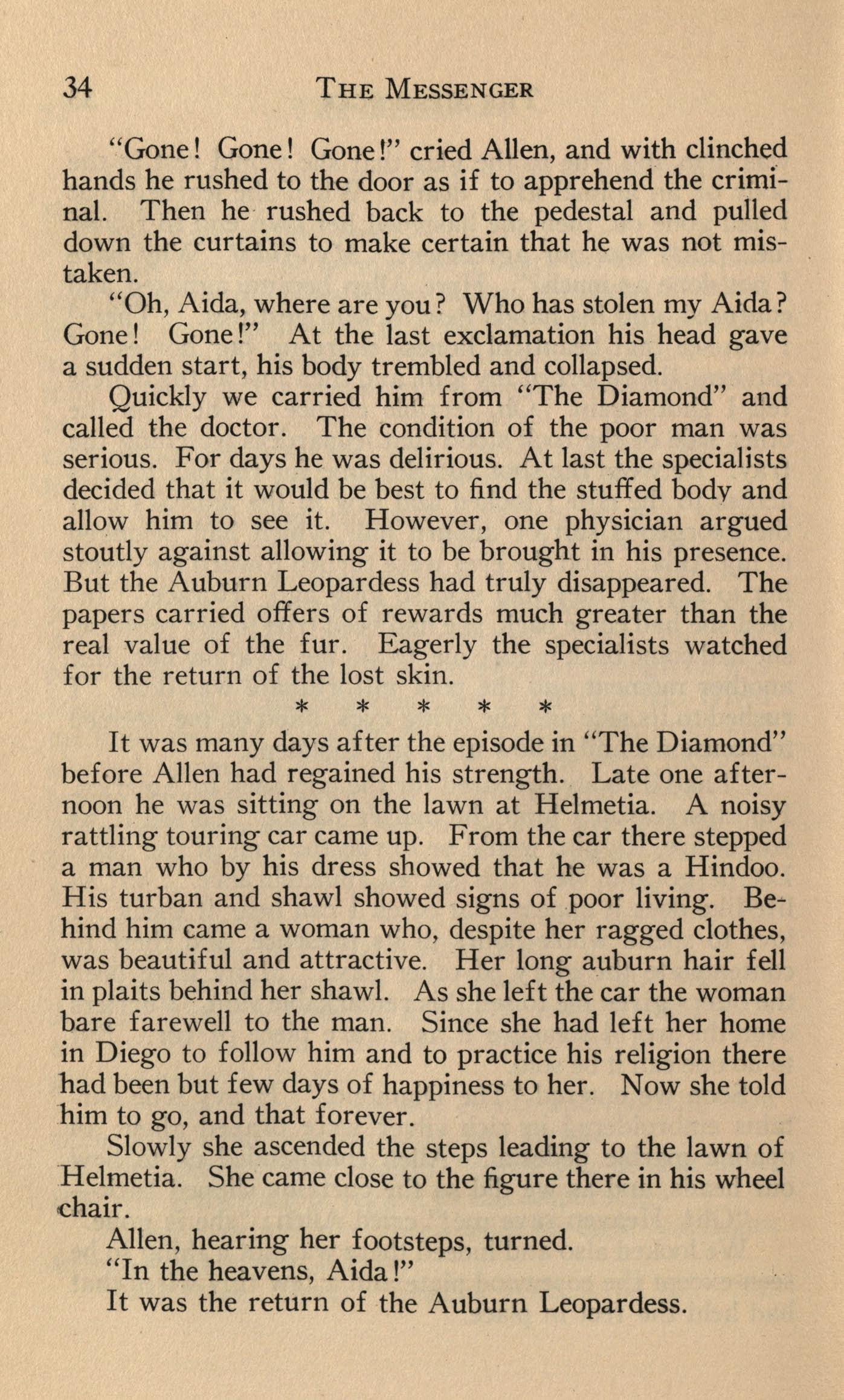
"Gone! Gone! Gone!" cried Allen, and with clinched hands he rushed to the door as if to apprehend the criminal. Then he rushed back to the pedestal and pulled down the curtains to make certain that he was not mistaken.
"Oh, Aida, where are you? Who has stolen my Aida? Gone! Gone!" At the last exclamation his head gave a sudden start, his body trembled and collapsed.
Quickly we carried him from "The Diamond" and called the doctor. The condition of the poor man was serious . For days he was delirious. At last the specialists decided that it would be best to find the stuffed body and allow him to see it. However, one physician argued stoutly against allowing it to be brought in his presence. But the Auburn Leopardess had truly disappeared. The papers carried offers of rewards much greater than the real value of the fur. Eagerly the specialists watched for the return of the lost skin. * * * * *
It was many days after the episode in " The Diamond" before Allen had regained his strength. Late one afternoon he was sitting on the lawn at Helmetia . A noisy rattling touring car came up. From the car there stepped a man who by his dress showed that he was a Hindoo. His turban and shawl showed signs of poor living. Behind him came a woman who, despite her ragged clothes, was beautiful and attractive. Her long auburn hair fell in plaits behind her shawl. As she left the car the woman bare farewell to the man. Since she had left her home in Diego to follow him and to practice his religion there had been but few days of happiness to her. Now she told him to go, and that forever.
Slowly she ascended the steps leading to the lawn of Helmetia. She came close to the figure there in his wheel chair.
Allen , hearing her footsteps, turned.
"In the heavens, Aida!"
It was the return of the Auburn Leopardess.

" A Midsummer Night's Dream," one of the earliest of Shakespeare's comedies, was written during the second literary period of his life, the period of rapid growth and development. This period extended inclusively from 1595 to 1600, marking the interim between previous years devoted to literary experimentation and succeeding years in which the ripened and mature skill of the dramatist shone forth in a masterful climax of productivity. In the works of this second period a more careful and comprehensive molding of plot structure and plot material is discernable. The latent powers of the artist began · to assume tangible form. Although still imperfect, they showed promise of a superior order of work. It is preposterous to. believe that the beginning of the following century, the Seventeenth, would see a deterioration of Shakespeare's literary potency. He was then only thirtysix years old and had completed his term as an apprentice; Thenceforth he was to be the master.
"A Midsummer Night's Dream" was written approximately five years prior to the period of mastery. As one would expect, it does not rank among Shakespeare's great productions. He had not gained at that time the surety which comes with experience.
The exact date of "A Midsummer Night's Dream', is largely a matter of conjecture. It probably was finished not later than 1595, although many critics set the date as 1594. The occasion for writing the play was the marriage of Shakespeare's patron, the Earl of Essex. It was the custom of the day that men of literary letters attach themselves to some one among the nobility, and Shakespeare was fortunate in gaining the good will of Essex. The latter became an inspiring and encouraging

mentor to him. It is perhaps interesting to note that Shakespeare's later depression began when political misfortune overcame his benefactor. After the death of Essex, the poet never wholly regained his former equanimity.
That Shakespeare was not after characterization is apparent. The occasion demanded a light, lyrical sketch, an absolute forbearance from the slightest trace of pathos, and while in parts of "A Midsummer Night's Dream" tragic events threaten to arise, the storm never breaks. The conclusion is in an atmosphere of serenity. There are present certain supernatural qualities which cause the play somewhat to resemble a Masque. Nature is the field for the setting, and it is there that fairies, sprites and mortals are brought together and left to the influence of a midsummer night.
. The theme of the comedy is love. Its inconsistencies, the dangers and tribulations to which it is subject are all portrayed by the poet. As Brandes has observed, the play deals with love "as a dream, a fever, an illusion, an . infatuation." The trials of the lovers in the forest cause Puck to break out inonically with the remark "What fools these mortals be."
The happy ending Shakespeare gives the play is suggestive of the optimism that pervaded him at the time. Had he attempted the play ten years later the conclusion would have undoubtedly been vastly different. The introduction and minor action lead to a state of affairs entirely favorable for a tragedy. And had Shakespeare's mood been other than what it was, he would not have eradicated the threatening outburst of the storm. The darkening clouds would have burst in a resounding paroxysm. Thus it is essential to understand the life of the man in order to grasp the inherent qualities of his works.
The purpose of the fir st act of "A Midsummer Night's Dre a m" is to introduce the main characters and to arouse

the interest in the story to be unfolded. One learns of the plight of the lovers, Lysander and Hermia, to whose marriage Egeus, Hermia's father, is violently opposed, and who states that if his daughter does not acquiesce in his wishes and marry his favored ·suitor for her hand, Demetrius, then shall he have the law of Athens upon her head. The law states that' should a woman ref\}se to . wed whomsoever her father chooses for: her, she shall have two alternatives: "either to die the death, or abjure forever the society of men." Rather than face such unpleasant consequences, Hermia consents to flee with Lysander to a place where the law of Athens has no sway.
The introduction is completed with the first scene of the second act, the remaining scene of this act beginning the action proper. · In this act the story of the fairies is introduced. Oberon, the king of the fairies, plans to punish the Queen, Titania, for disobedience by having Puck, his sprite, anoint her eyes with the juice of a magical flower, .which has the effect of causing the person so anointed to fall in love with the first living creature he beholds.
The story of the lovers is also advanced in this act. Demetrius, pursuing the fleeing lovers, is overtaken by Helena, whom he loved prior to his affection for Hermia. The fairy, Oberon, hears the two quarrel, and desirous of setting things right, ·dispatches Puck with the magic potion to anoint the eyes of Demetrius, assuming that - Helena will be the ·first person he will see, and that his love for her will return. Puck is told that he will know Demetrius by his Athenian clothing. Lysander, unfortunately, als9 wears similar garments, and complications begin when he is mistaken for his i-ival. Puck later learns of his ~rror, and working on the theory that it is never too late, anoints the eyes of Detnetrius ·also. The ·two lovers unhappily perceive Helena, and both fall in love

with her. Poor Hermia is forgotten, while the rivals go forth to fight for Helena's affections.
The third act brings yet another story into the action, that of the tradesmen of Athens. These men are preparing to act a play in honor of the marriage of the Duke of Athens. While they are rehearsing in the forest near the resting place of the fairy-queen, Titania, she wakes and falls in love with the chief comedian, Bottom. The latter has received the head of an ass, but to the enchanted Titania this only adds to his personal beauty. Thus at the commencement of the fourth act, an intricate plot has been built up, which appears almost incapable of disen• tanglement.
With the fourth act the falling action commences. The unraveling of the complications is completed. Oberon has compassion -upon the queen, and •dissolves the spell upon her so that she comes to abhor Bottom. · Thus the poor ac'tor's role as master of the fairies was only momentary. Demetrius loves his first love, Helena, again; the irate Egeus withdraws his objections to Lysander's suit, and all is made ready for the coming marriage of the Duke of Atheris.
The fifth act of "A Midsummer Night's Dream" could well have been omitted. The story had been told, and the conclusion reached. The purpose of this act is to satisfy and appease the curiosity of the audience, which was aroused by the -proposed play of Bottom's company. It is seen that there are four different threads which are interwoven to form the plot. Two of these story threads are joined in the first scene of the first act; these are the love of Lysander for Hermia, and the love which Demetrius formerly harbored for Helena and which she is contriving to regain. The story of the fairies enters the . plot structure in the first scene of the second act when Oberon resolves to bring peace about by using the magicjuice to anoint the eyes of Demetrius. The other story, that of the tradesmen, enters in the third act.
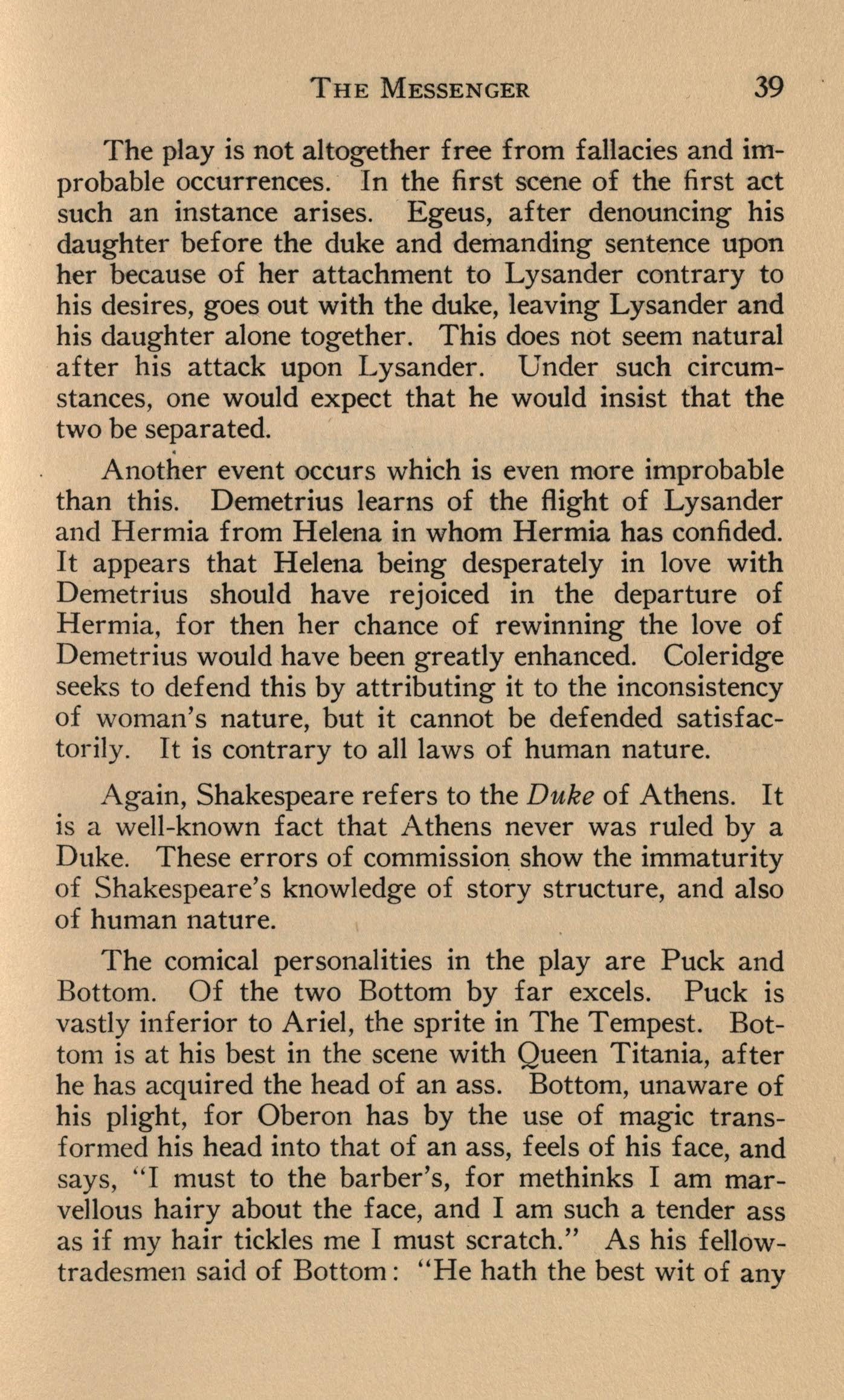
The play is not altogether free from fallacies and improbable occurrences. In the first scene of the first act such an instance arises. Egeus, after denouncing his daughter before the duke and demanding sentence upon her because of her attachment to Lysander contrary to his desires, goes out with the duke, leaving Lysander and his daughter alone together. This does not seem natural after his attack upon Lysander. Under such circumstances, one would expect that he would insist that the two be separated.
Another event occurs which is even more improbable than this. Demetrius learns of the flight of Lysander and Hermia from Helena in whom Hermia has confided. It appears that Helena being desperately in love with Demetrius should have rejoiced in the departure of Hermia, for then her chance of rewinning the love of Demetrius would have been greatly enhanced. Coleridge seeks to def end this by attributing it to the inconsistency of woman's nature, but it cannot be defended satisfactorily . It is contrary to all laws of human nature.
Again, Shakespeare refers to the Duke of Athens. It is a well-known fact that Athens never was ruled by a Duke. These errors of commission show the immaturity of Shakespeare's knowledge of story structure, and also of human nature.
The comical personalities in the play are Puck and Bottom. Of the two Bottom by far excels. Puck is vastly inferior to Ariel, the sprite in The Tempest. Bottom is at his best in the scene with Queen Titania, after he has acquired the head of an ass. Bottom, unaware of his plight, for Oberon has by the use of magic transformed his head into that of an ass, feels of his face, and says, ''I must to the barber's, for methinks I am marvellous hairy about the face, and I am such a tender ass as if my hair tickles me I must scratch." As his fellowtradesmen said of Bottom : "He hath the best wit of any

handicraft man in Athens; yea, and the best person, too; and he is a very paramour for a sweet voice."
Sh;ikespeare has taken the occasion to put into the mouth of Theseus, the Duke of Athens, his own conception of the poet and the poet's function. The lines are highly suggestive of the poet himself :
"The poet's eye, in a fine frenzy rolling, Doth glance from heaven to earth, from earth to heaven, And as imagination bodies forth The forms of things unknown, the poet's pen Turns them to shape and gives to airy nothing
A local habitation and a name."
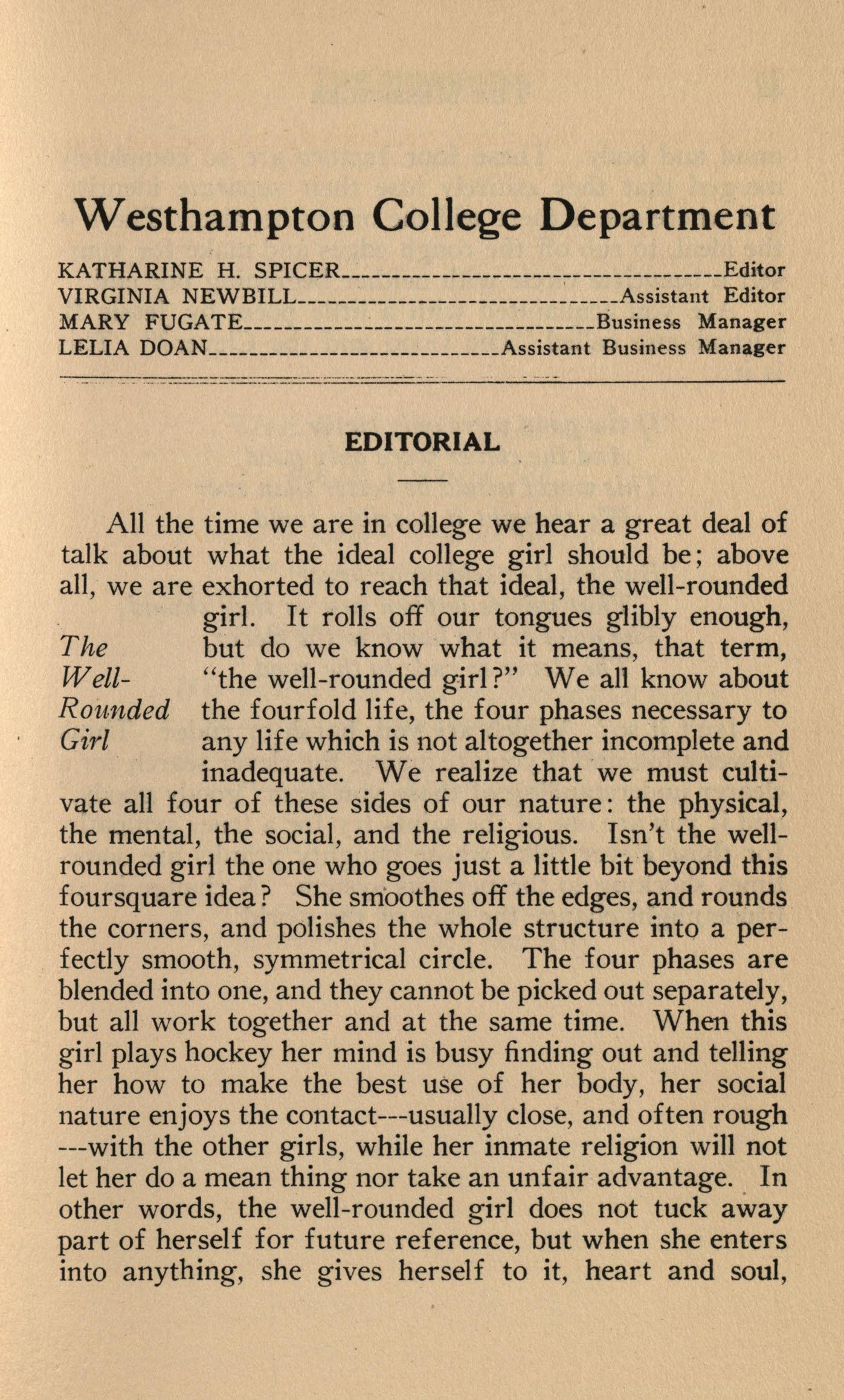
KATHARINE H. SPICER ______________________________________
Editor
VIRGINIA NEWBILL-------------------------~-----Assistant Editor
MARY FUGATE ____________..:_______________________Business Manager
LELIA DOAN _____________________________Assistant Business Manager
All the time we are in college we hear a great deal of talk about what the ideal college girl should be; above all, we are exhorted to reach that ideal, the well-rounded
The WellRounded Girl girl. It rolls off our tongues glibly enough, but do we know what it means, that term, "the well-rounded girl?" We all know about the fourfold life, the four phases necessary to any life which is not altogether incomplete and inadequate. We realize that ·we must cultivate all four of these sides of our nature : the physical, the mental, the social, and the religious. Isn't the wellrounded girl the one who goes just a little bit beyond this foursquare idea? She sm·oothes off the edges, and rounds the corners, and polishes the whole structure into a perfectly smooth, symmetrical circle. The four phases are blended into one, and they cannot be picked out separately, but all work together and at the same time. When this girl plays hockey her mind is busy finding out and telling her how to make the best use of her body, her social nature enjoys the contact---usually close, and often rough ---with the other girls, while her inmate religion will not let her do a mean thing nor take an unfair advantage. In other words, the well-rounded girl does not tuck away part of herself for future reference, but when she enters into anything, she gives herself to it, heart and soul,

mind and body. These four factors are so completely merged that they entirely lose their separate identity, and where one is there will the others be, also. There is the ideal, to rub off the rough edges and make for yourself a beautiful circle with neither beginning nor end .
. Are you acquainted with a little poem by Jessie B. Rittenho .use called "The Good and the Clever?" This is it:
'·'If the good were only clever, And the clever were only good, This world would be better than ever . We thought it possibly could.
"But, oh, it is seldom or never That things happen just as they should; The good are so harsh to the clever, The clever so rude to the good."
Isn't it so? Which are you, harsh or rude? Think it over a bit, and if you are among the clever search for a clearer understanding of those you term "goody goody," and if you are one of the saints try for a truer sympathy for those clever folks whose naughty pranks are sometimes shocking to the nervous system. A change in attitude might change the face of the world.

1 know a garden securely walled From all who would enter there; Within the fountain is bare and dry And weeds have grown everywhere.
It is always dusk, and the breeze that blows Whispers of pain untold,
And it scatters the petals of withered flowers On an altar broken and cold.
The garden's a heart, once warm and light Before there came a day When someone went out , who locked the gate And never came back that way.
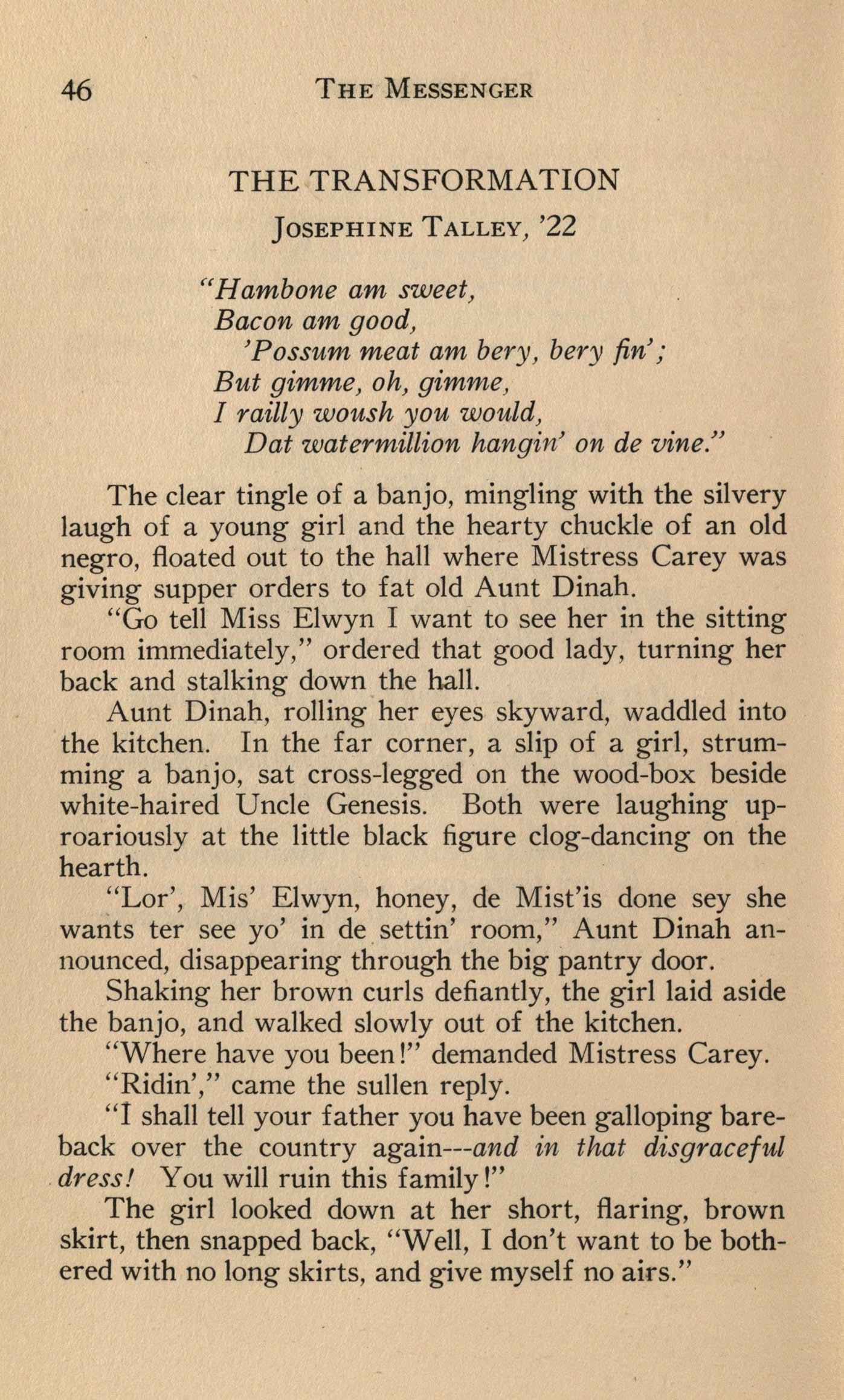
"H ambone am sweet, Bacon am good, 'Possum meat am bery , bery fin'; But gimme, oh, gimme , I railly woush you would, Dat watermillion hangin' on de vine."
The clear tingle of a banjo, mingling with the silvery laugh of a young girl and the hearty chuckle of an old negro, floated out to the hall where Mistress Carey was giving supper orders to fat old Aunt Dinah.
"Go tell Miss Elwyn I want to see her in the sitting room immediately," ordered that good lady, turning her back and stalking down the ha.ll.
Aunt Dinah, rolling her eyes skyward, waddled into the kitchen. In the far corner, a slip of a girl, strumming a banjo, sat cross-legged on the wood-box beside white-haired Uncle Genesis. Both were laughing uproariously at the little black figure clog-dancing on the hearth.
"Lor', Mis' Elwyn, honey, de Mist'is done sey she wants ter see yo' in de settin' room," Aunt Dinah announced, disappearing through the big pantry door.
Shaking her brown curls defiantly, the girl laid aside the banjo, and walked slowly out of the kitchen.
"Where have you been!" demanded Mistress Carey. "Ridin'," came the sullen reply.
"1 shall tell your father you have been galloping bareback over the country again---and in that disgraceful . dress! You will ruin this family!"
The girl looked down at her short, flaring, brown skirt, then snapped back, "Well, I don't want to be bothered with no long skirts, and give myself no airs."
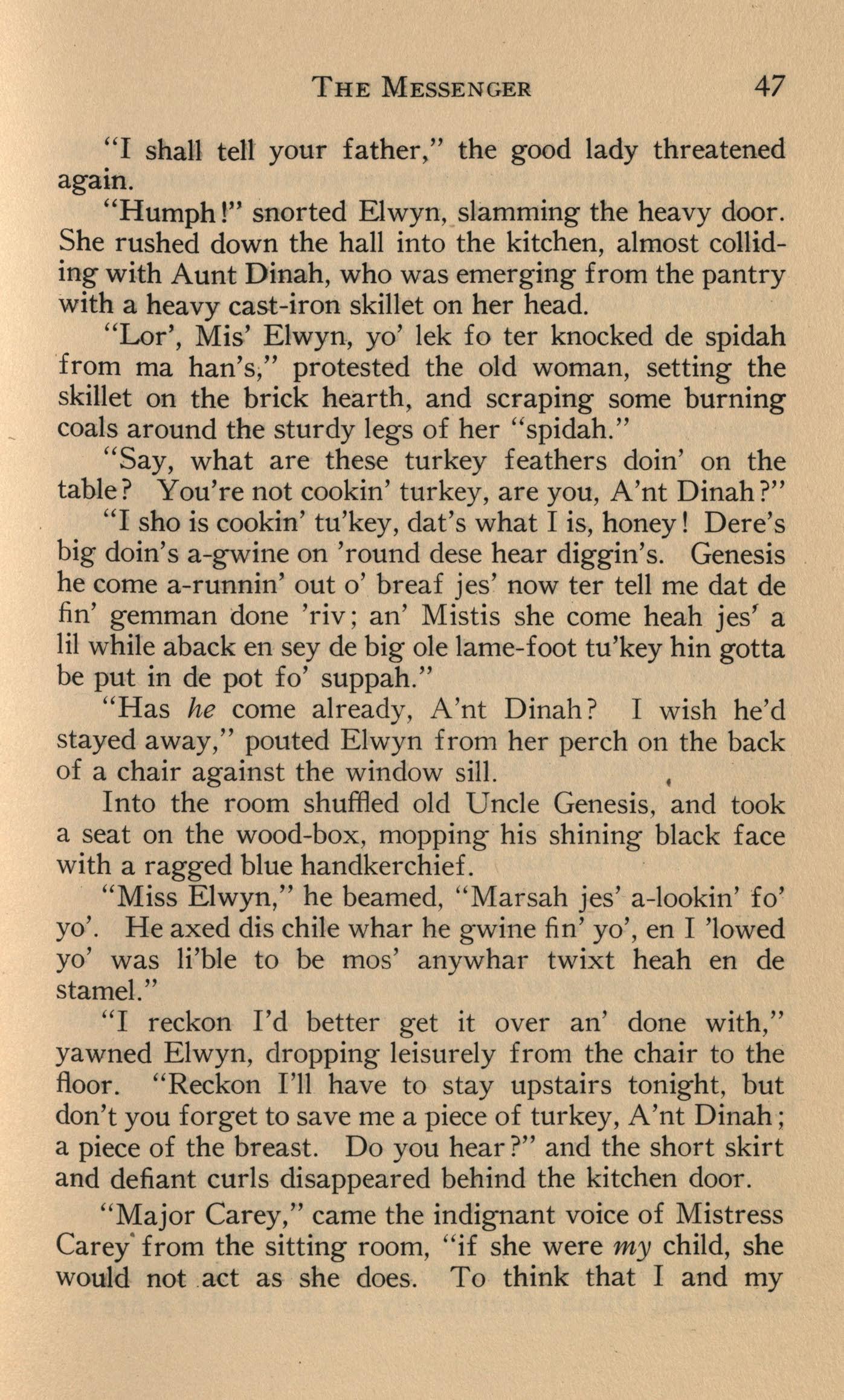
'.'I shall tell your father," the good lady threatened agam.
"Humph!" snorted Elwyn, slamming the heavy door. She rushed down the hall into the kitchen, almost colliding with Aunt Dinah, who was emerging from the pantry with a heavy cast-iron skillet on her head.
"Lor', Mis' Elwyn, yo' lek fo ter knocked de spidah from ma han's," protested the old woman, setting the skillet on the brick hearth, and scraping some burning coals around the sturdy legs of her "spidah ."
"Say, what are these turkey feathers <loin' on the table? You're not cookin' turkey, are you, A'nt Dinah?"
"I sho is cookin' tu'key, dat's what I is, honey! Dere's big <loin's a-gwine on 'round dese hear diggin's. Genesis he come a-runnin' out o' breaf jes' now ter tell me dat de fin' gemman done 'riv; an' Mistis she come heah jes' a lil while aback en sey de big ole lame-foot tu'key hin gotta be put in de pot fo' suppah."
"Has he come already, A ' nt Dinah? I wish he'd stayed away," pouted Elwyn from her perch on the back of a chair against the window sill. ,
Into the room shuffled old Uncle Genesis, and took a seat on the wood-box, mopping his shining black face with a ragged blue handkerchief.
"Miss Elwyn," he beamed , "Marsah jes' a-lookin' fo' yo' . He axed dis chile whar he gwine fin' yo', en I 'lowed yo' was li'ble to be mos' anywhar twixt heah en de stamel."
"I reckon I'd better get it over an' done with," yawned Elwyn, dropping leisurely from the chair to the floor. "Reckon I'll have to stay upstairs tonight, but don't you forget to save me a piece of turkey, A'nt Dinah; a piece of the breast. Do you hear?" and the short skirt and defiant curls disappeared behind the kitchen door.
"Major Carey," came the indignant voice of Mistress Carey" from the sitting room, "if she were my child, she would not act as she does. To think that I and my

daughters should be eternally disgraced by that tom-boy daughter of yours. She will have to put on some decent clothes before Sir Geoffrey sees her. I tell you, you must speak to her."
When the swish of silk and the slamming of a door told Elwyn that her stepmother was gone, she bounded into the room and caught the Major around the neck.
"Fa-ather !" she laughed gleefully.
"My child," began the Major with a most serious expression on his usually beaming countenance, "your stepmother is very much displeased with---"
"Well, I reckon she is," gurgled the girl as she pushed the Major into the deep chair before the fire, and seated herself upon his knee. "But you aren't displeased with me., are you?" she asked wistfully. "You like me as I am, don't you?"
"Of course I do, Winnie," melted the Major, "but--but your stepmother thinks you ought to be---to be more ---more---"
"Ladylike," supplied Elwyn, impudently running her fingers through the Major's iron-gray hair. "Well, if ladylike means lookin' like her daughters, I don't want to look ladylike. Just because I'm eighteen is no reason why I've got to do my hair up like a hornet's nest on top of my head, an' sweep the floor with my skirts, an' sit up an' smile at those silly men when they tell me I'm beautiful, an' they know all the time that not a word of it's so. Well, I'm jes' not going to grow up. I don't want to see that Englishman anyway. I'll go upstairs an' keep out o' his way till he's gone, for I jus' won ' t grow up!" ---and her small shoe came perilously near stamping on the Major's big foot.
"But, my dear," remonstrated the Major.
Blowing a kiss to the Major, Elwyn skipped out of the room, whistling at the top of her voice.
* * * * * *
"Lor', Mis' Elwyn, honey, am yo' done wak' . a'ready?" asked Aunt Dinah affectionately, as she kindled a fire in
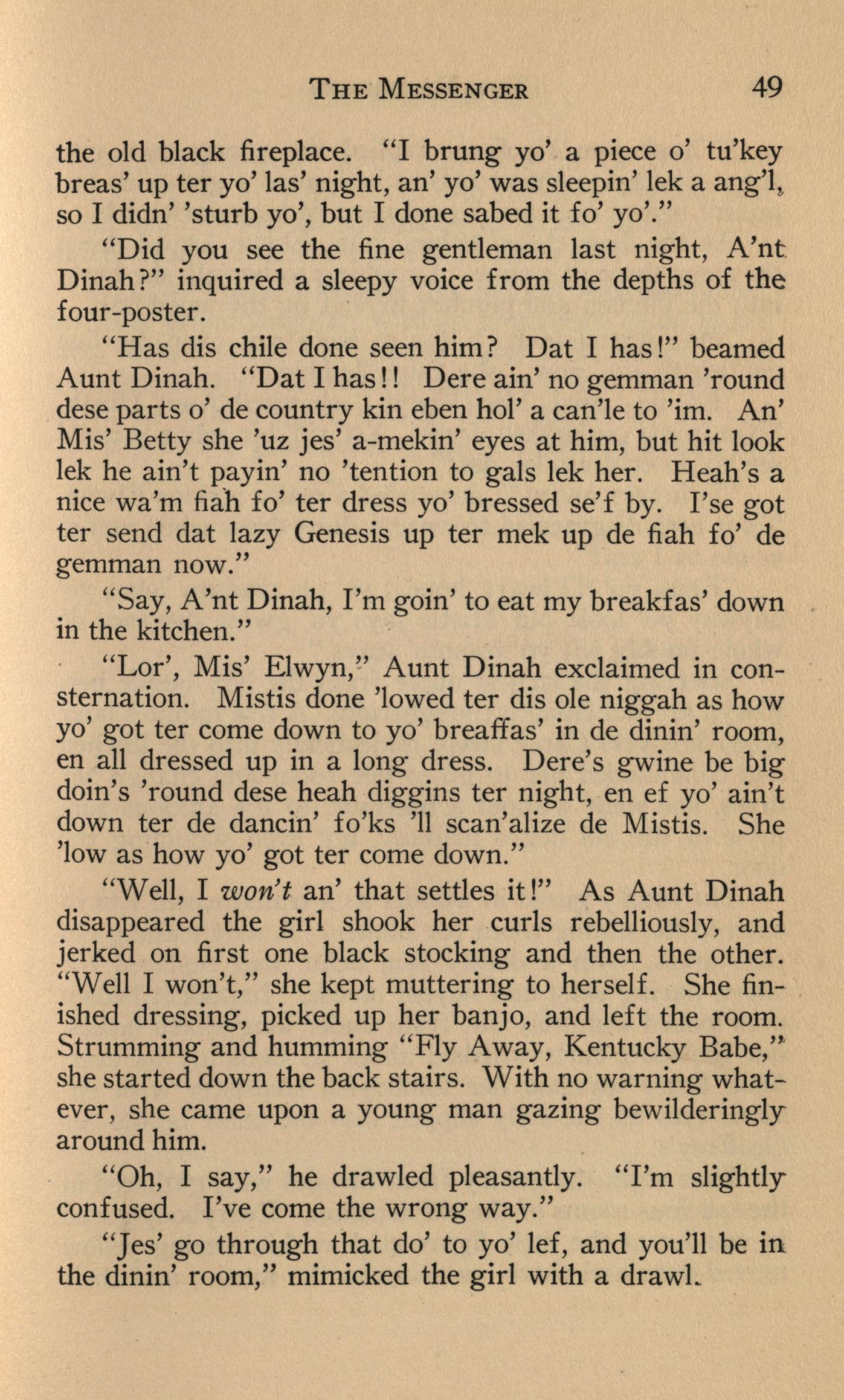
the old black fireplace. "I brung yo' a piece o' tu'key breas' up ter yo' las' night, an' yo' was sleepin' lek a ang'l i so I didn' 'sturb yo', but I done sabed it fo' yo'."
"Did you see the fine gentleman last night, A'nt Dinah?" inquired a sleepy voice from the depths of the four-poster. ,
"Has dis chile done seen him? Dat I has!" beamed Aunt Dinah . "Dat I has!! Dere ain' no gemman 'round dese parts o' de country kin eben hol' a can'le to 'im. An' Mis' Betty she 'uz jes' a-mekin' eyes at him, but hit look lek he ain't payin' no 'tention to gals lek her. Heah's a nice wa'm fia·h fo' ter dress yo' bressed se'f by. I'se got ter send dat lazy Genesis up ter mek up de fiah fo' de gemman now."
"Say, A'nt Dinah, I'm goin' to eat my breakfas' down in the kitchen."
"Lor', Mis' Elwyn, ~ ' Aunt Dinah exclaimed in consternation. Mistis done 'lowed ter dis ole niggah as how yo' got ter come down to yo' breaff as' in de dinin' room, en all dressed up in a long dress. Dere' s gwine be big <loin's 'round dese heah diggins ter night, en ef yo' ain't down ter de dancin' fo'ks '11 scan'alize de Mistis. She 'low as how yo' got ter come down."
" Well, I won't an' that settles it!" As Aunt Dinah disappeared the girl shook her curls rebelliously, and jerked on first one black stocking and then the other. "Well I won't," she kept muttering to herself. She fin- , ished dressing, picked up her banjo, and left the room. Strumming and humming "Fly Away, Kentucky Babe," · she started down the back stairs. With no warning whatever, she came upon a young man gazing bewilderingly around him.
"Oh, I say," he drawled pleasantly. "I'm slightly confused. I've come the wrong way."
"Jes' go through that do' to yo' lef, and you'll be in the dinin' room," mimicked the girl with a drawl.

"Thank you," politely replied the young man into space where a moment before had stood a girl with impudent brown eyes and a profusion of long dark curls.
As the door closed behind him, Elwyn leaped down the steps three at a time. Laughing to herself she burst into the kitchen and perched herself on the wood-box.
"Oh, A'nt Dinah, I like to have run over the fine gentleman jus' now," she fairly bubbled.
"Fo' de Lawd, Mis' Elwyn ," shrieked Aunt Dinah. "Not in dat outlandish dress! Yo' ain' bin whar 'e could see yo' in er dress lek dat !"
"Is it very awful?" demanded a really serious Elwyn. "Is it very disgraceful to wear a short dress when you're as old as I am?"
"Bress yo' li'l heart, honey, yo' ole mammy lobes yo' anyway yo' look, but Mistis says yo' gwine disgrace de whole fambly wif yo' rompin' ways."
Selecting the largest apple from the box beside her, Elwyn sat munching it thoughtfully. A few minutes later when Mistress Carey swept majestically into the kitchen and commanded her to go to her room and change her dress, she went without a murmur, to the anxious surprise of the old negro mammy, not even slamming the door.
The family gazed in wonder as a transformed Elwyn ,entered the dining room for dinner. A soft trailing old rose dress, with a dainty lace fichu, had replaced the short, flaring skirt and boyish blouse. Impudent brown eyes looked demurely out from under long silken lashes, but the dark- curls whisked about as defiantly as ever. Miss Betty watched her tomboyish stepsister with en·vious eyes as she slyly slipped into the chair beside Sir ,Geoffrey's.
That night the gentry from far and wide gathered in tbe spacious rooms of the old mansion. Everybody gazed in wonder at the little figure clad in sh.immering yellow moved here and there, swaying to the music; and their

amazement increased when they saw Sir Geoffrey lead her out of the crowded room into the deep window seat in the hall. They all speculated as to the cause of this sudden transformation, but Elwyn never told.
In after years, whenever the subject was mentioned, her little granddaughter, with ah impudence equal t0 her own, would shake her golden curls bewitchingly, and smile knowingly into the laughing blue eyes of her grandfather as if to suggest that in ·their depths lay the real reason why her grandmother had so suddenly grown up.

HELEN G. TAYLOR, '22
In spite of my ever-increasing professionalism in the art of traveling, I have riever yet lost the rather disturbing sensations that accompany my journeys from "here to there." The Day of Departure dawns; it is stamped so indelibly on my brain that, for once, I arise without the usual "blow, bugle, blow; answer, echo, answer" performance of my mother, oft-times repeated. In fact, I wake with a violent start every quarter of the hour during the night. With nervous fingers I slip into my clothes, laid out the night before, and descend to the dining room to "indigest" my breakfast. Each chew is to the accompaniment of the "tick-tock" of my watch and the "Did you forget---?" and "Tell your aunt---," et cetera, of my mother. Then, with a final dash to my room for possible left-behinds and a quick farewell to my mother and the "little ones" ---it hurst so to say goodbye---! am hurried to the car by my practical father, who realizes that trains now leave on schedule time. As we turn the corner, I give one last look at the old house and wave to the group clustered at the door.
I am ushered hastily through the gates and on the train, as we only have about three minutes. I find that suddenly my brain has become a vacuum, so I more vigornt1sly than brilliantly start a conversation of "Do you suppose I shall be on the shady side!" and "The train is starting---you'd better hurry!" Thus, father makes his exit!
Then comes that sinking, lost-your-friend feeling, that weighty sensation in my throat and the mental repetition of the recent farewell scene. In the whirlpool of my brain one thought is ever growing clearer---! have left something! Yes, I am sure of it! After a frantic
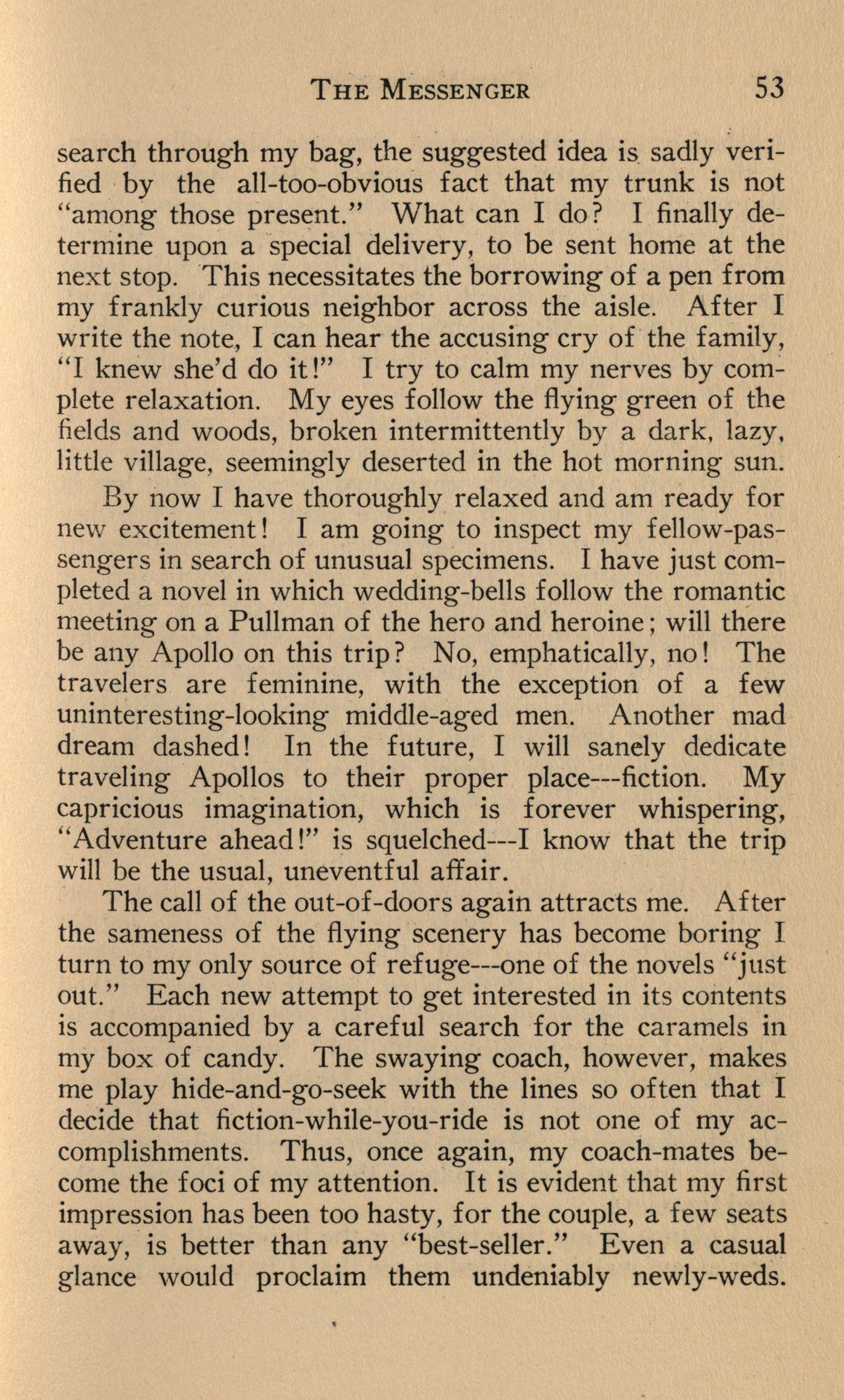
search through my bag, the suggested idea is. sadly verified by the all-too-obvious fact that my trunk is not "among those pres~nt." What can I do? I finally determine upon a special delivery, to be sent home at the next stop. This necessitates the borrowing of a pen from my frankly curious neighbor across the aisle. After I write the note, I can hear the accusing cry of the family, "I knew she'd do it!" I try to calm my nerves by com.:. plete relaxation. My eyes follow the flying green of the fields and woods, broken intermittently by a dark, lazy , little village, seemingly deserted in the hot morning sun. By now I have thoroughly relaxed and am ready for ne w excitement! I am going to inspect my fellow-passengers in search of unusual specimens . I have just completed a novel in which wedding-bells follow the romantic meeting on a Pullman of the hero and heroine; will there be any Apollo on this trip? No, emphatically, no! The travelers are feminine, with the exception of a few uninteresting-looking middle-aged men. Another mad dream dashed! In the future, I will sanely dedicate traveling Apollos to their proper place---fiction. My capricious imagination, which is forever whispering, " Adventure ahead!" is squelched---! know that the trip will be the usual, uneventful affair.
The call of the out-of-doors again attracts me. After the sameness of the flying scenery has become boring I turn to my only source of refuge---one of the novels "just out." Each new attempt to get interested in its contents is accompanied by a careful search for the caramels in my box of candy. The swaying coach, however, makes me play hide-and-go-seek with the lines so of ten that I decide that fiction-while-you-ride is not one of my accomplishments. Thus, once again, my coach-mates become the foci of my attention. It is evident that my first impression has been too hasty, for the couple, a few seats away, is better than any "best-seller." Even a casual glance would proclaim them undeniably newly-weds.
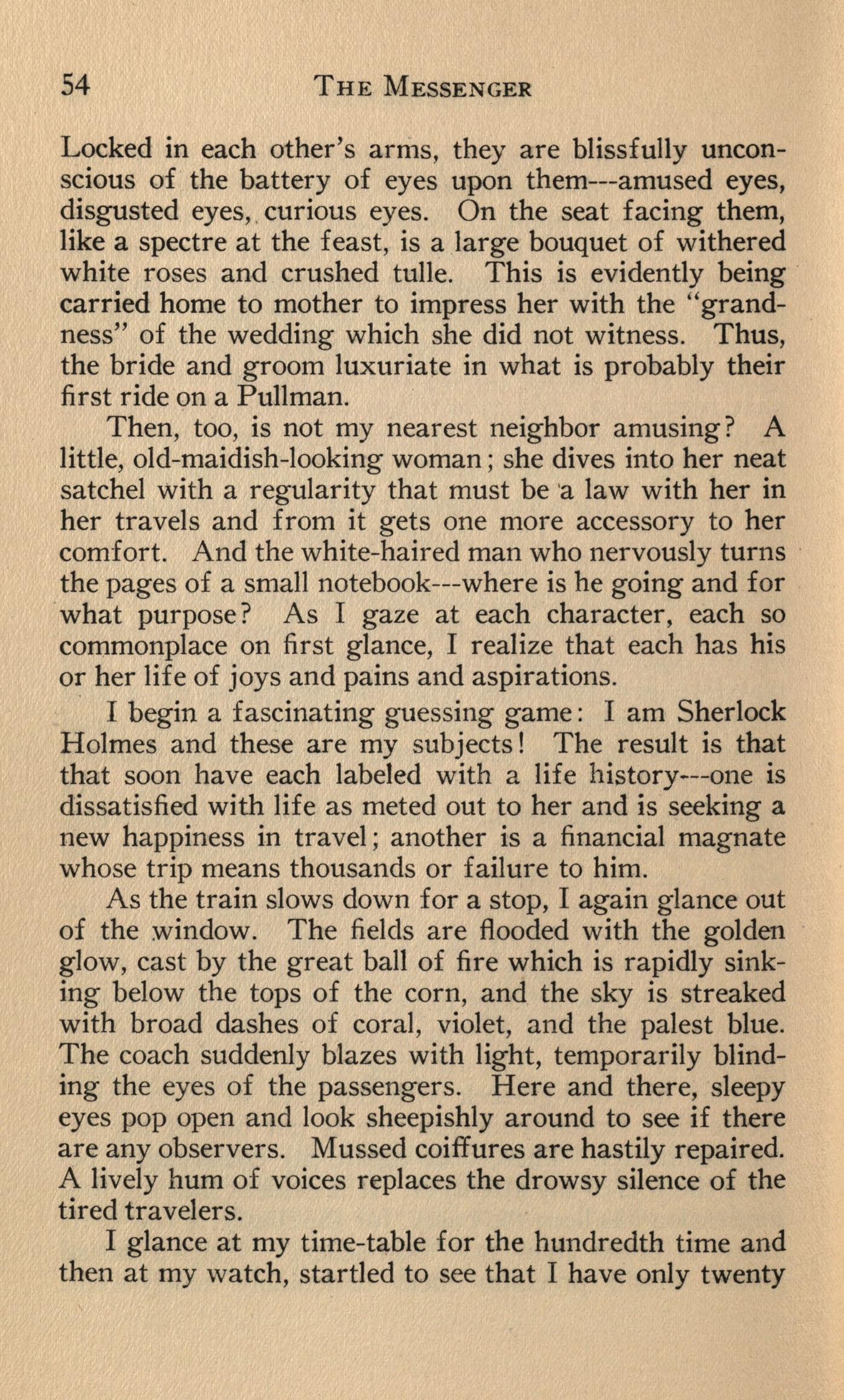
Locked in each other's arms, they are blissfully unconscious of the battery of eyes upon them---amused eyes, disgusted eyes, . curious eyes. On the seat facing them, like a spectre at the feast, is a large bouquet of withered white roses and crushed tulle. This is evidently being carried home to mother to impress her with the "grandness" of the wedding which she did not witness. Thus, the bride and groom luxuriate in what is probably their first ride on a Pullman.
Then, too, is not my nearest neighbor amusing? A little, old-maidish-looking woman ; she dives into her neat satchel with a regularity that must be ·a law with her in her travels and from it gets one more accessory to her comfort. And the white-haired man who nervously turns the pages of a small notebook---where is he going and for what purpose? As I gaze at each character, each so commonplace on first glance, I realize that each has his or her life of joys and pains and aspirations.
I begin a fascinating guessing game : I am Sherlock Holmes and these are my subjects! The result is that that soon have each labeled with a life history---one is dissatisfied with life as meted out to her and is seeking a new happiness in travel; another is a financial magnate whose trip means thousands or failure to him.
As the train slows down for a stop, I again glance out of the window. The fields are flooded with the golden glow, cast by the great ball of fire which is rapidly sinking below the tops of the corn, and the sky is streaked with broad dashes of coral, violet, and the palest blue. The coach suddenly blazes with light, temporarily blinding the eyes of the passengers. Here and there, sleepy eyes pop open and look sheepishly around to see if there are any observers. Mussed coiffures are hastily repaired. A lively hum of voices replaces the drowsy silence of the tired travelers.
I glance at my time-table for the hundredth time and then at my watch, startled to see that I have only twenty
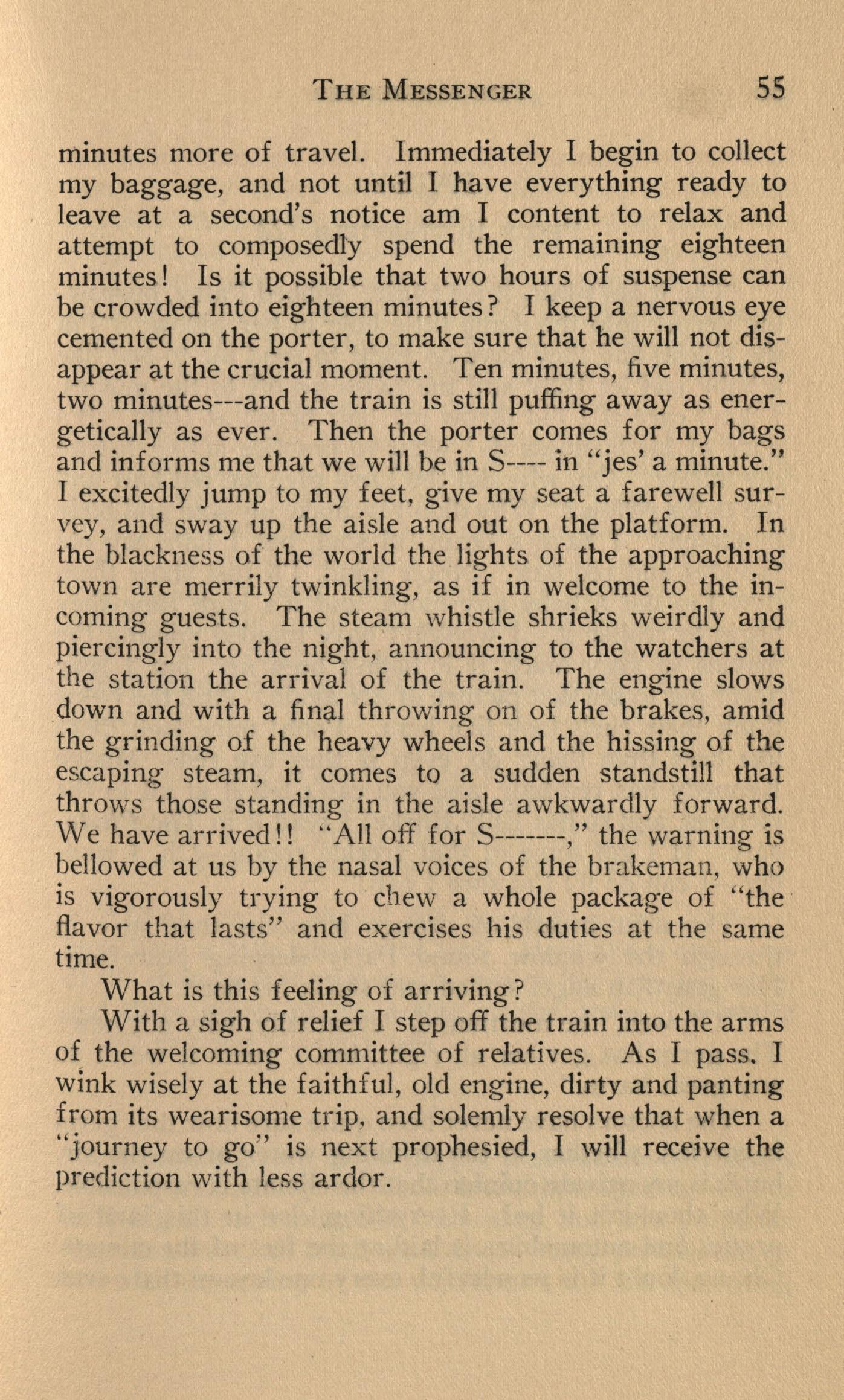
minutes more of travel. Immediately I begin to collect my baggage, and not until I have everything ready to leave at a second's notice am I content to relax and attempt to composedly spend the remaining eighteen minutes! Is it possible that two hours of suspense can be crowded into eighteen minutes? I keep a nervous eye cemented on the porter, to make sure that he will not disappear at the crucial moment. Ten minutes, five minutes, two minutes---and the train is still puffing away as energetically as ever. Then the porter comes for my bags and informs me that we will be in S----in "jes' a minute." I excitedly jump to my feet, give my seat a farewell survey, and sway up the aisle and out on the platform. In the blackne s s of the world the lights of the approaching town are merrily twinkling, as if in welcome to the incoming guests. The steam whistle shrieks weirdly and piercingly into the night, announcing to the watchers at the station the arrival of the train. The engine slows down and with a fim;tl throwing on of the brakes, amid the grinding of the heavy wheels and the hissing of the escaping steam, it comes to a sudden standstill that throws those standing in the aisle awkwardly forward. We have arrived!! "All off for S-------," the warning is bellowed at us by the nasal voices of the br a k eman , wh0 is vigorously trying to ·chew a whole package of "the · flavor that lasts" and exercise s his duties at the same time.
With a sigh of relief I step off the train into the arms of _ the welcoming committee of relatives. As I pass. I wink wisely at the faithful, old engine, dirty and panting from its wearisome trip , and solemly resolve that ,vhen a ''journey to go" is next prophesied, I will receive the prediction with less ardor.
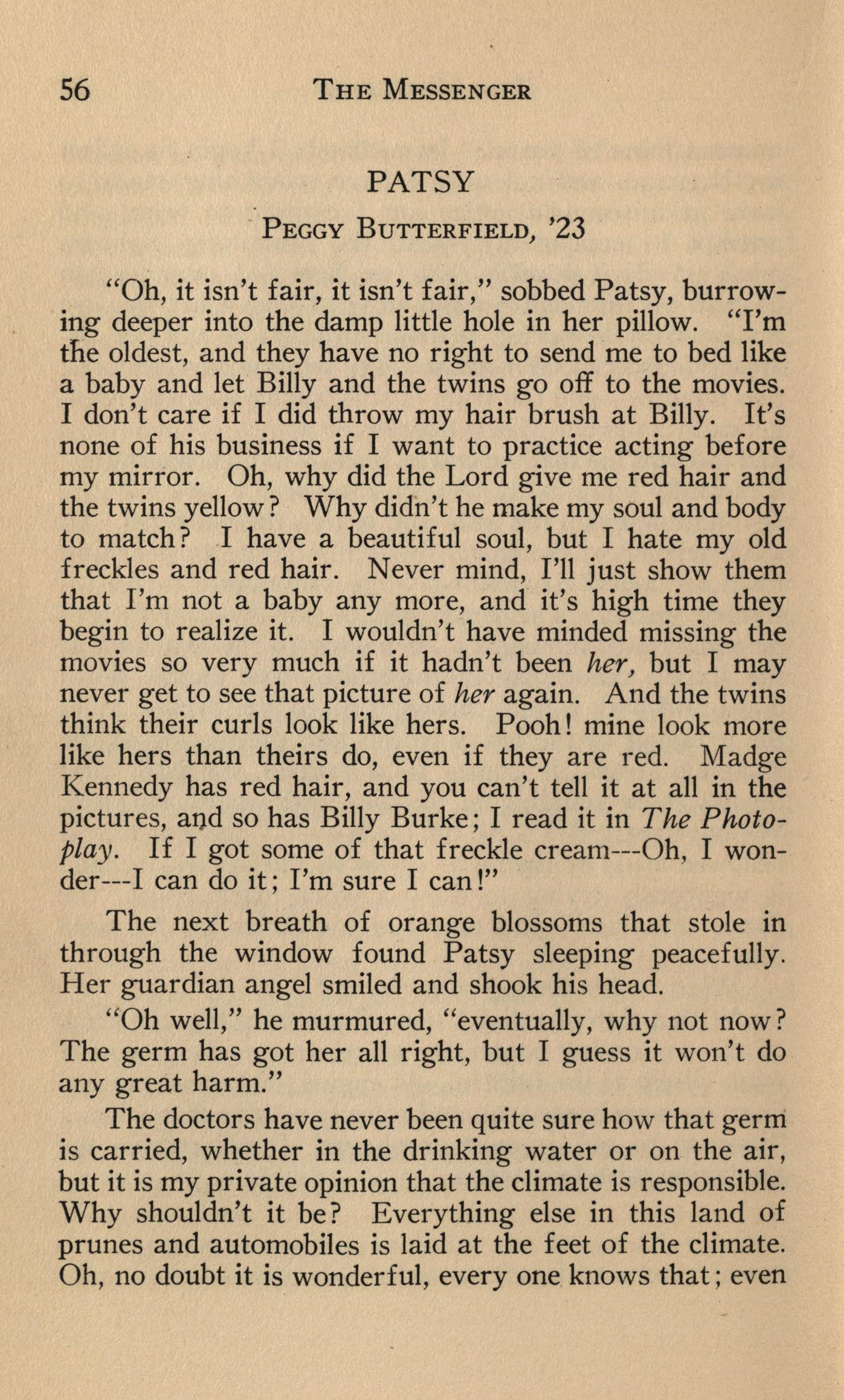
"Oh, it isn't fair, it isn't fair," sobbed Patsy, burrowing deeper into the damp little hole in her pillow . "I'm the oldest, and they have no right to send me to bed like a baby and let Billy and the twins go off to the movies. I don't care if I did throw my hair brush at Billy. It's none of his business if I want to practice acting before my mirror. Oh, why did the Lord give me red hair and the twins yellow? Why didn't he make my soul and body to match? I have a beautiful soul, but I hate my old freckles and red hair. Never mind, I'll just show them that I'm not a baby any more, and it's high time they begin to realize it. I wouldn't have minded missing the movies so very much if it hadn't been her, but I may never get to see that picture of her again. And the twins think their curls look like hers. Pooh! mine look more like hers than theirs do, even if they are red. Madge Kennedy has red hair, and you can't tell it at all in the pictures, and so has Billy Burke; I read it in The Photoplay. If I got some of that freckle cream---Oh , I wonder- --I can do it; I'm sure I can!"
The next breath of orange blossoms that stole in through the window found Patsy sleeping peacefully. Her guardian angel smiled and shook his head.
" Oh well," he murmured, "eventually, why not now? The germ has got her all right, but I guess it won't do any great harm."
The doctors have never been quite sure how that germ is carried, whether in the drinking water or on the air, but it is my private opinion that the climate is responsible. Why shouldn't it be? Everything else in this land of prunes and automobiles is laid at the feet of the climate. Oh, no doubt it is wonderful, every one knows that; even
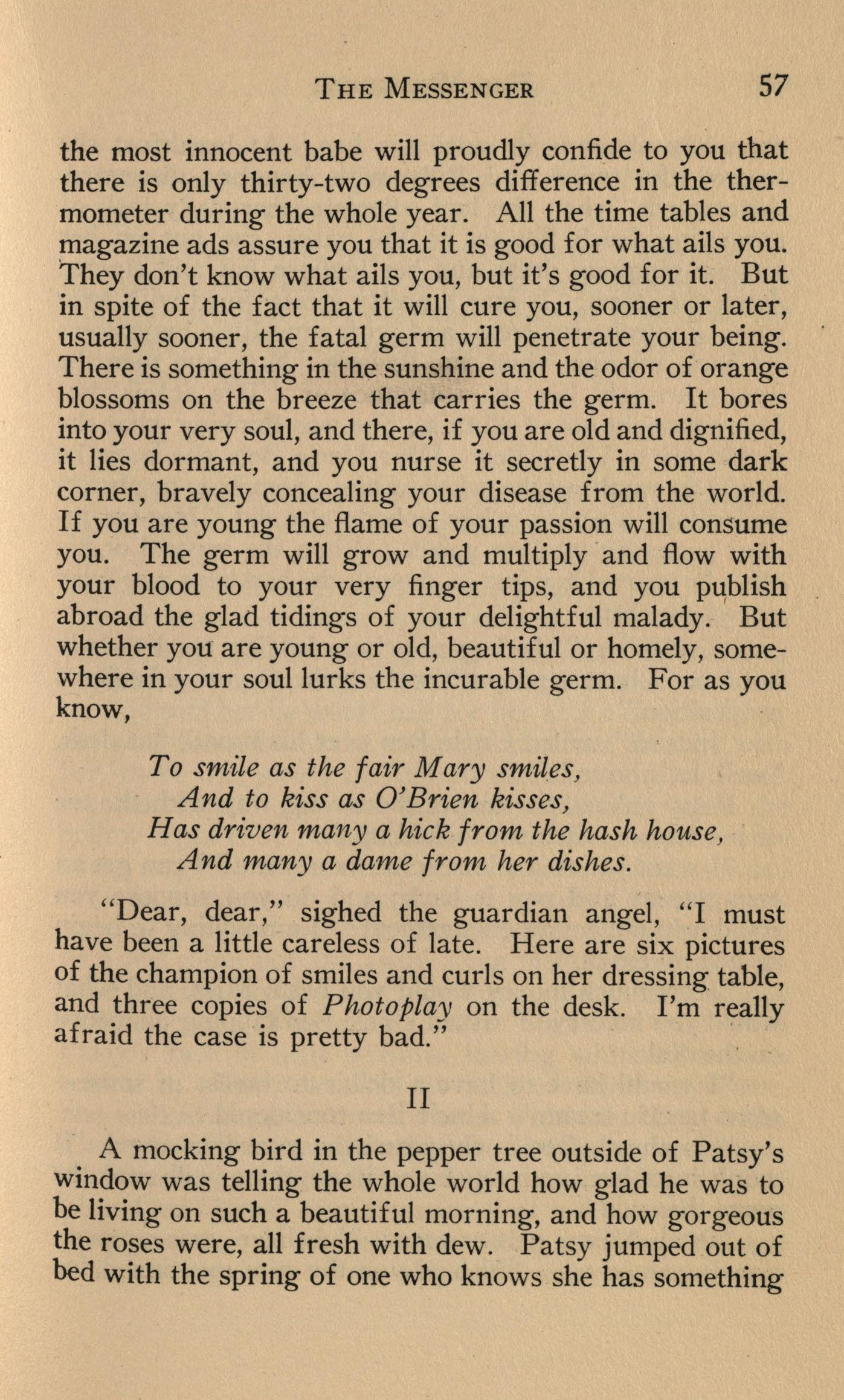
the most innocent babe will proudly confide to you that there is only thirty-two degrees difference in the thermometer during the whole year. All the time tables and magazine ads assure you that it is good for what ails you. They don't know what ails you, but it's good for it. But in spite of the fact that it will cure you, sooner or later, usually sooner, the fatal germ will penetrate your being. There is something in the sunshine and the odor of orange blossoms on the breeze that carries the germ. It bores into your very soul, and there, if you are old and dignified, it lies dormant, and you nurse it secretly in some dark corner, bravely concealing your disease from the world. If you are young the flame of your passion will consume you. The germ will grow and multiply and flow with your blood to your very finger tips, and you publish abroad the glad tidings of your delightful malady. But whether you are young or old, beautiful or homely, somewhere in your soul lurks the incurable germ. For as you know,
To smile as the fair Mary smiles, And to kiss as O'Brien kisses, Has driven many a hick from the hash house, And many a dame from her dishes.
"Dear, dear," sighed the guardian angel, "I must have been a little careless of late. Here are six pictures of the champion of smiles and curls on her dressing table, and three copies of Photoplay on the desk. I'm really afraid the case is pretty bad."
A mocking bird in the pepper tree outside of Patsy's window was telling the whole world how glad he was to be living on such a beautiful morning, and how gorgeous the roses were, all fresh with dew. Patsy jumped out of bed with the spring of one who knows she has something
especially pleasant in store for her. At breakfast she treated the twins and Billy with haughty disregard. Afterwards, when she had completed her daily task of arranging fresh flowers in the vases, she put on her longest gingham dress and her leghorn hat and started · down the street. It was a pretty street, lined with long rows of eucalyptus trees, and with snug little bungalows set back amongst vines and flowers. Now and then the breeze brought her the fragrance of a late acacia, but Patsy thought not of all this. She was thinking what she would say to Uncle Ben. Dear Uncle Ben, she knew he would do anything she asked of him. Somehow he always understood a person when nobody else did. He was indeed an understanding spirit. When she arrived at his office he treated her just as though she had been a regular grown-up client.
''Uncle Ben," she began, primly folding her hands in her lap, "I have a proposition to make to you, a business proposition."
"Indeed," smiled Uncle Ben over his broad, flat desk, ''well, let's have it."
Patsy rubbed the carpet the wrong way with the toe of her slipper; then she looked up.
"I want you to lend me some money until I can get an engagement and pay it back; and do you suppose you could help me get an engagement? I am willing to begin as just an extra."
"How much money would you need, Miss, and what would you invest in?" asked Uncle Ben tapping his pencil on the desk.
"I would have to have a dollar to invest in some--some freckle cream." Uncle Ben considered.
"Go ahead, Ben," whispered the guardian angel, "it won't hurt her. and you know if anything will cure the germ that will." ·
''Well, Miss," he answered, "I believe your proposition is a good one. I'll lend you the sum mentioned for
.
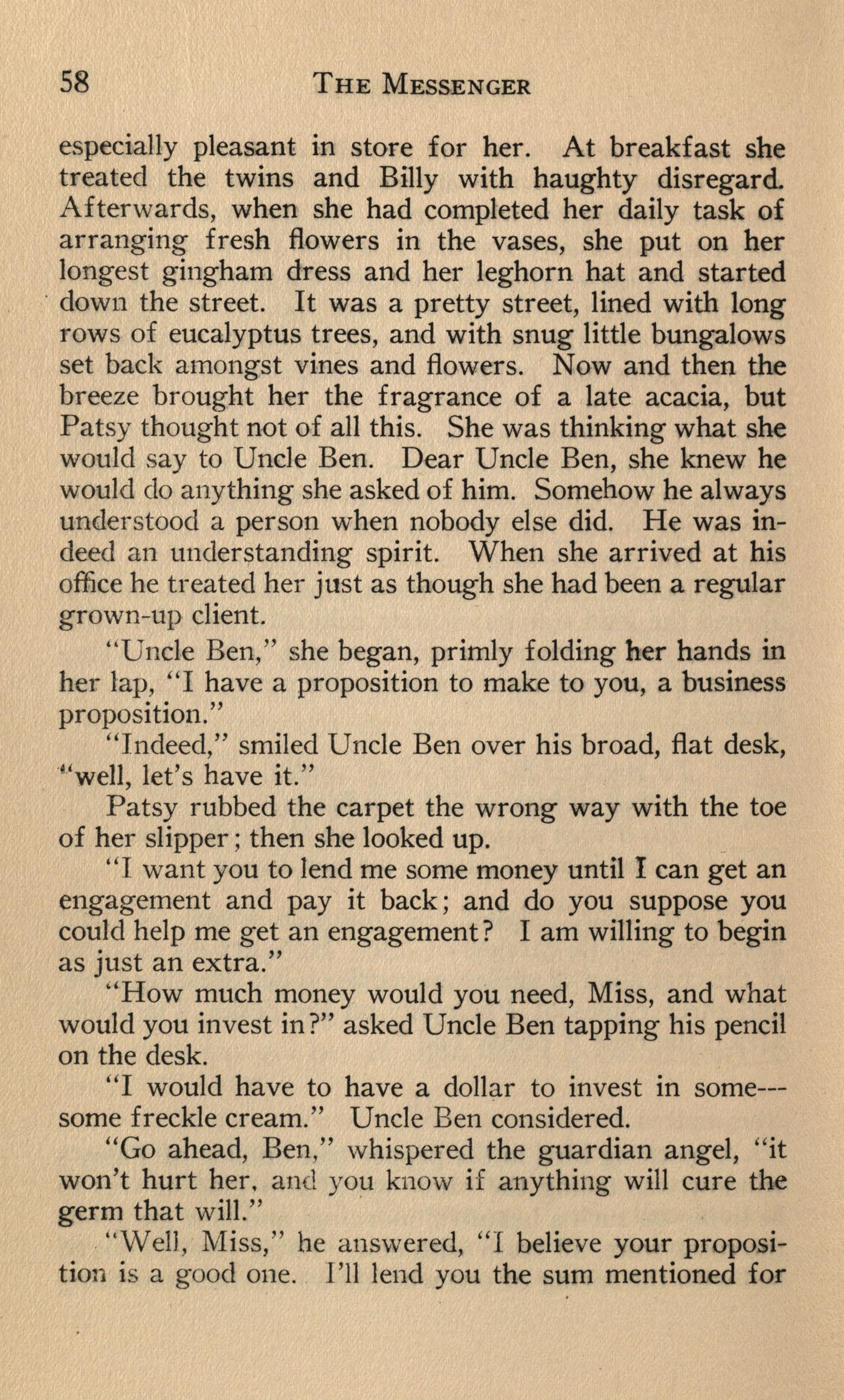

the---er---inv ,estment on condition that you accept no engagement without my permission. I think I cap get you one in a couple of weeks."
"Oh, Uncle Ben, you're a brick," cried Patsy, throwing her arms around his neck. It was agreed that it would be wiser if they kept this affair as a surprise for the family, and Patsy went away with her dollar and a very happy heart.
Patsy applied the freckle cream religiously, and when Uncle ·Ben finally came in his little roadster to take her for "a ride" she felt quite sure that her freckles were almost gone. Yes, Uncle Ben had gotten a part for her. Her dreams were about to be realized. She would join the throng of sunbeam chasers at last. When they reached the studio, Uncle Ben introduced her to the director and told her he would call for her at 5 o'clock. After she was dressed and the make up man had finished with her, there wa:s plenty of time to stand around, and wait for her scene. The sun beat down pitilessly upon the hollow square of buildings in which the pictures were being staged. She roamed down a street which seemed to be in Hindustan or somewhere equally Oriental, and, turning a corner suddenly, came upon a wild-west ranch. In a log cabin not far away some make-believe soldiers were playing ukeleles, and a girl in an Hawaiian costume was dancing. The grease paint began to run down Patsy's face in little streams, leaving white river beds behind it. There was not an inch of shade anywhere. She walked along a row of rooms with only three walls. There a painter was painting the sink in an apartment kitchenette, and next door a lady was hanging a "God Bless Our Home" over the mantel of an old farm house sitting room. A convict was taiking gayly with a girl in a bathing suit. Now she could see . the framework
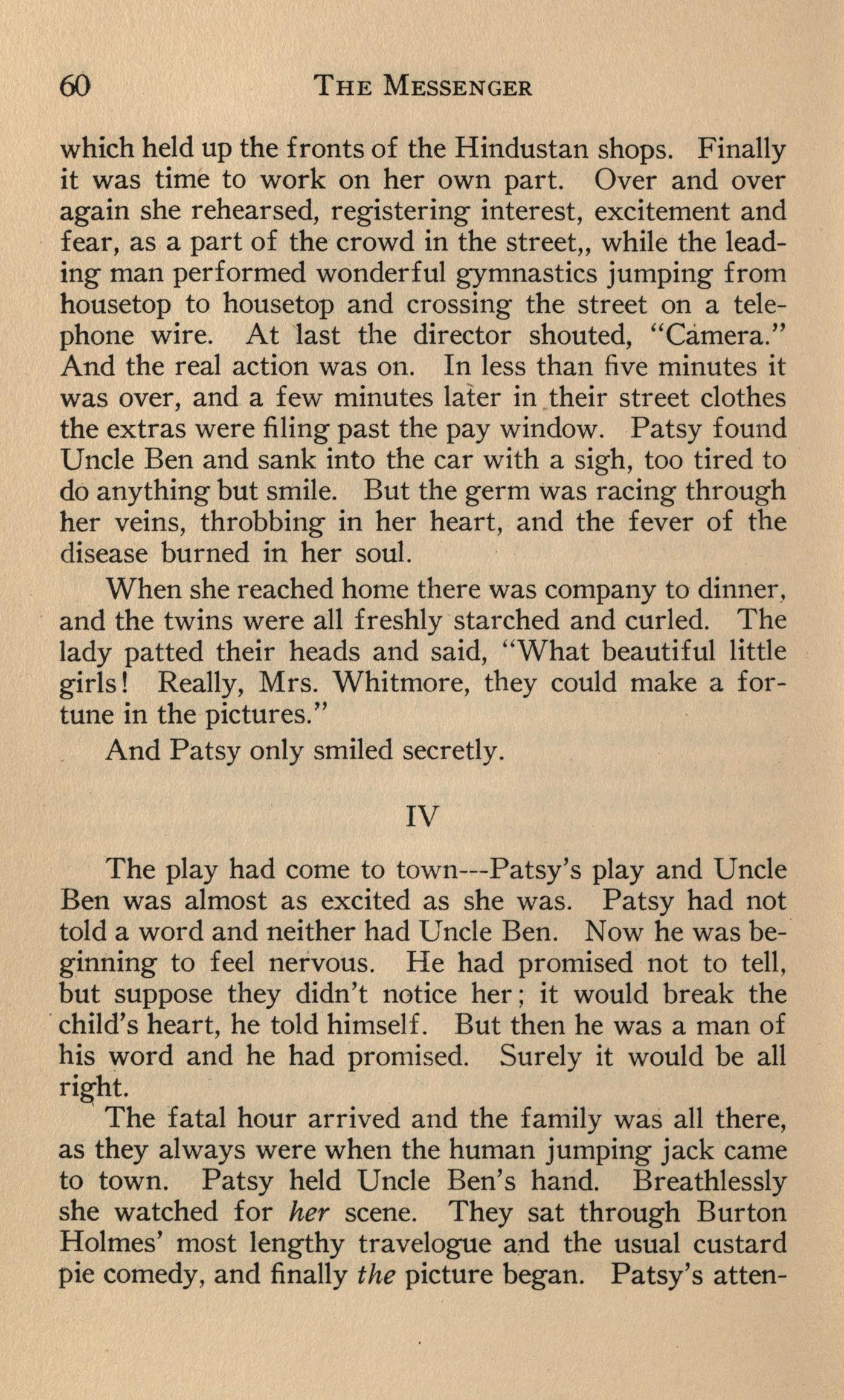
which held up the fronts of the Hindustan shops. Finally it was time to work on her own part. Over and over again she rehearsed, registering interest, excitement and fear, as a part of the crowd in the street,, while the leading man performed wonderful gymnastics jumping from housetop to housetop and crossing the street on a telephone wire. At last the director shouted, "Camera." And the real action was on. In less than five minutes it was over, and a few minutes later in their street clothes the extras were filing past the pay window. Patsy found Uncle Ben and sank into the car with a sigh, too tired to do anything but smile. But the germ was racing through her veins, throbbing in her heart, and the fever of the disease burned in her soul.
When she reached home there was company to dinner, and the twins were all freshly starched and curled. The lady patted their heads and said, "What beautiful little girls! Really, Mrs. Whitmore, they could make a fortune in the pictures."
And Patsy only smiled secretly.
The play had come to town---Patsy's play and Uncle Ben was almost as excited as she was. Patsy had not told a word and neither had Uncle Ben. Now he was beginning to feel nervous. He had promised not to tell, but suppose they didn't notice her; it would break the ·child's heart, he told himself. But then he was a man of his word and he had promised. Surely it would be all rig-ht.
The fatal hour arrived and the family was all there, as they always were when the human jumping jack came to town. Patsy held Uncle Ben's hand. Breathlessly she watched for her scene. They sat through Burton Holmes' most lengthy travelogue and the usual custard pie comedy, and finally the picture began. Patsy's atten-
tion was torn between the family and the picture. Mother leaned over and whispered, "For goodness sake, sit still, Patsy."
"Oh look!" cried Patsy. For just at that moment the hero climbed across the street on a telephone wire, while the mob below registered interest, excitement and fear. In a moment it was over, and they were watching the hero descend into the house on the other side of the street.
When they reached home, Patsy ventured carelessly, "What did you think of that mob scene?"
"I don't remember any mob scene," said Billy, "what about it?"
"Oh, nothing," said Patsy, I---I think I'll go to bed." When she turned out her light and dived into bed she had the strange sensation of having swallowed an apple whole.
"I'll show them, I'll show them yet," she muttered. The guardian angel sighed and shook his head. "Humph," he thought, "and I guess she will; the symptoms look as though that germ will be fatal."
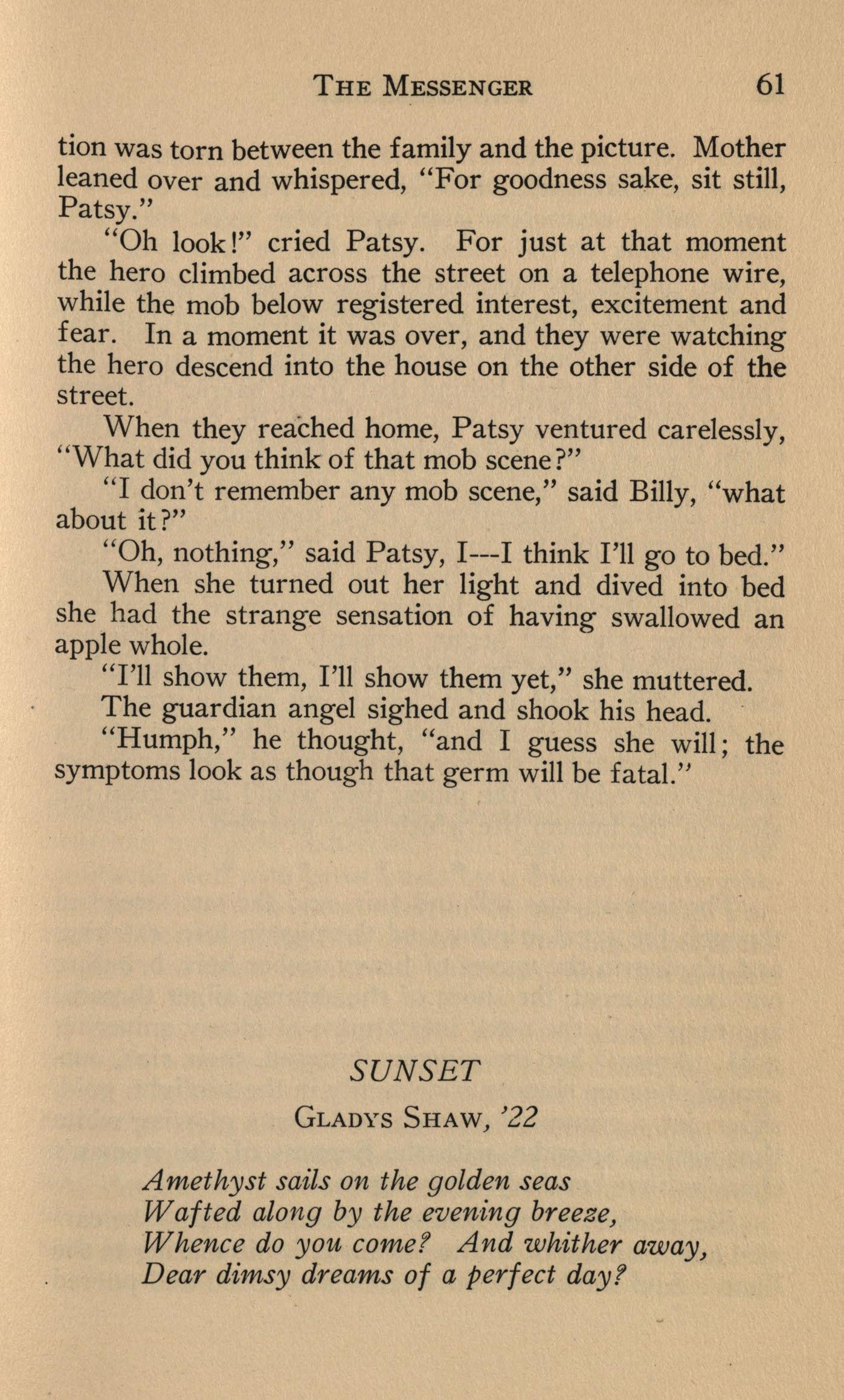
Amethyst sails on the golden seas Wafted along by the even£ng breeze, Whence do you come? And whither away, Dear dimsy dreams of a perfect day?

The passengers, who lolled back, lazily, in their cushioned Pullmans as the express train whirred through that long stretch of country just after leaving Baltimore, little realized what lurked behind that great barrier of pines that reared up and up, so sturdily beside the track. They knew that as they were being rapidly borne away the poignantly sweet perfume of the pines was wafted to them, elusively, suggestively, for a moment, and then it became again only an uninteresting, monotonous country, receding ever, ever. Perhaps the reporter, who sleepily wished for something to happen, who wanted a story; or the writer who had begun seriously to doubt whether real romance existed any more, after all, would have lost some of their ennui as they looked out on the great wall of everlasting greenness had they tried to penetrate its depths. Perhaps in the very patience and endurance, yet sweetly sad odor of the pines, they would have read the story of the human life which they guarded. * * * * * *
The woman was tall and fair, and the sun streamed through the great windows of the pigeon lo£t, catching and playing in the waves of heavy amber hair, bringing out, one moment , the sheen of the shining silver threads, and turning it, the next, into a mass of glossy quivering gold. Around her the pigeons fluttered, their rich, outspread plumage shining iridescently in the sunlight, gold, silver , jet, a glimmering green, and then a glowing white that vied in splendor with the fineness of the woman's cheek as they brushed lightly against it.
She reached a long slender hand into the pan she carried and a stream of shining grain fell shimmering to the floor. And as the birds fluttered and cooed and purred
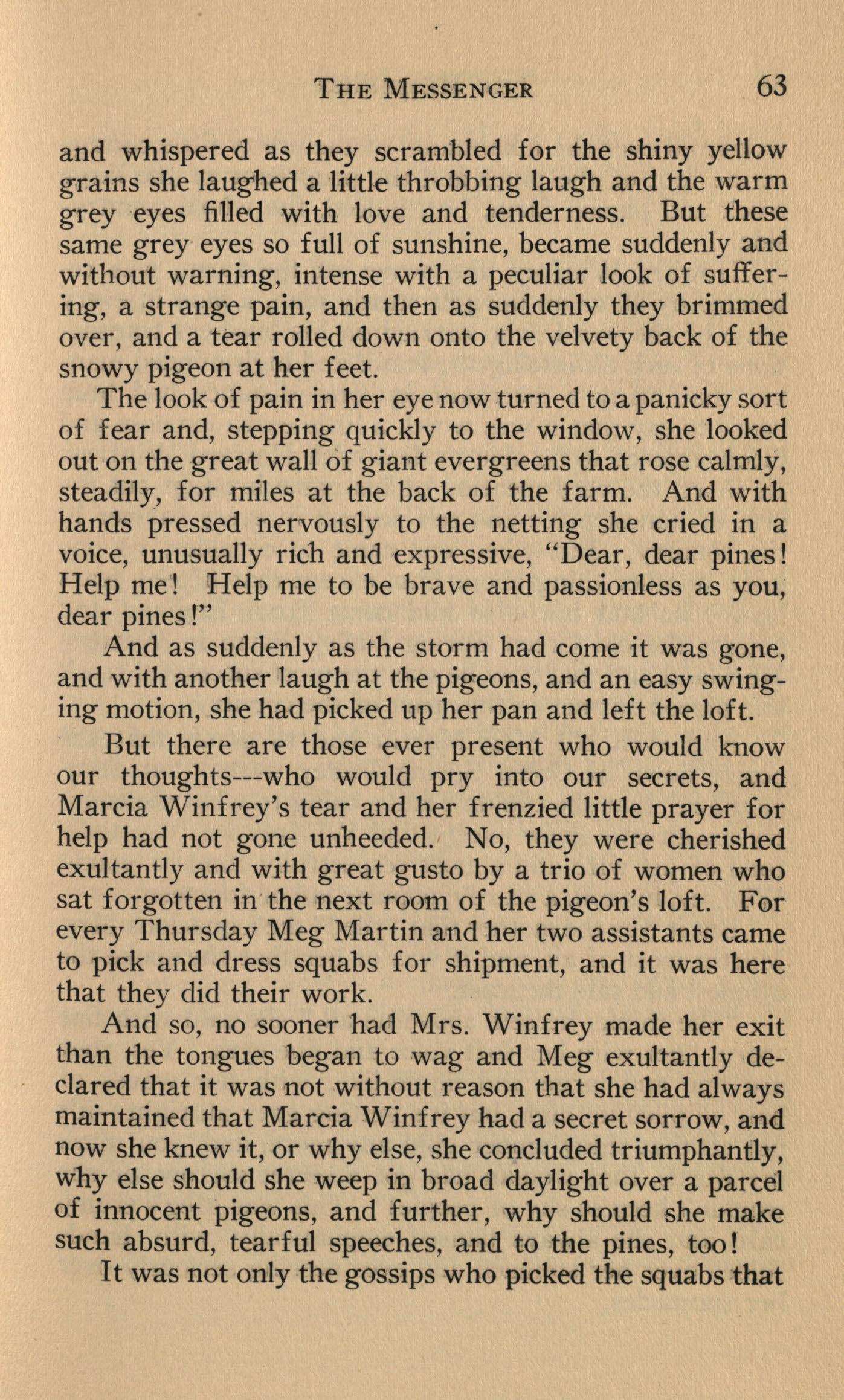
and whispered as they scrambled for the shiny yellow g,rains she laughed a little throbbing laugh and the warm grey eyes filled with love and tenderness. But these same grey ·eyes so full of sunshine, became suddenly and without warning, intense with a peculiar look of suffering, a strange pain, and then as suddenly they brimmed over, and a tear rolled down onto the velvety back of the snowy pigeon at her feet.
The look of pain in her eye now turned to a panicky sort of fear and, stepping quickly to the window, she looked out on the great wall of giant evergreens that rose calmly, steadily, for miles at the back of the farm. And with hands pressed nervously to the netting she cried in a voice, unusually rich and expressive, "Dear, dear pines! Help me! Help me to be brave and passionless as you, dear pines!"
And as suddenly as the storm had come it was gone, and with another laugh at the pigeons, and an easy swinging motion, she had picked up her pan and le£t the lo£t.
But there are those ever present who would know our thoughts---who would pry into our secrets, and Marcia Winfrey's tear and her frenzied little prayer for help had not gone unheeded. No, they were cherished exultantly and with great gusto by a trio of women who sat forgotten in ·the next room of the pigeon's loft. F0r every Thursday Meg Martin and her two assistants came to pick and dress squabs for shipment, and it was here that they did their work.
And so, no sooner had Mrs. Winfrey made her exit than the tongues began to wag and Meg exultantly declared that it was not without reason that she had always maintained that Marcia Winfrey had a secret sorrow, and now she knew it, or why else, she concluded triumphantly, why else should she weep in broad daylight over a parcel of innocent pigeons, and further, why should she make such absurd, tearful speeches, and to the p.ines, too!
It was not only the gossips who picked the squabs that

wondered over the inhabitants of the pretty little cottage at the foot of the pines and the proprietor of the large truck and pigeon farm, but, indeed, the whole countryside.
Howard :Winfrey, the owner of the farm, was respected by all as an upright sturdy man, a man in every sense of the word, who carried on his business transactions in such an intelligent, frank and high-minded manner that many a merchant at some distance had been heard to say that it was worth a little extra expense and inconvenience to be able to deal with Howard Winfrey. In short, the very mention of his name brought out the best of honest pride and self-respect in every farmer in the country. But when one came to consider, no one knew another thing about him, except that fifteen years before he and his wife had come from England and bought the old Green Spring Valley Farm in Western Maryland and that now he was the most successful truck and pigeon farmer in that part of the country.
And even old Meg Martin had to admit that the people down at Green Spring Valley were "that closemouthed" that she couldn't add a thing to what the countryside already knew except that Winfrey was devotedly fond of his wife and almost respectfully fond of young Winfrey, his son, a sturdy, popular lad of fourteen.
But it was the mother that "riled" the loquacious Mrs. Martin most of all, and it was of her that she spoke the of ten est and said the least.
"She thinks herself above us all," she said with fine scorn, "her with her soft voice and fine eyes. Yes, they are fine and large and liquid-like, with her waves of hair all piled up high, but it's getting grey all right---it's not all that shiny amber gold any more, and, you mark my words, that woman has got a secret sorrow, or she wouldn't keep so shy of people!" This was Meg's trump card and she always paused emphatically with hands folded over her stomach and eyes peering seriously over her spectacles.

"But she's kind enough," Meg's really good heart forced her to resume, "yes, she's good and kind and sweet with it all, though folks would like her better if she weren't so standoffish and distant."
And now Meg had something to add to her account and she thrilled with the pride of the true artist as she though of how she would open people's eyes with her astounding discovery, that she had seen Marcia Winfrey cry! How that cold English reserve had been broken at last. .
That evening when the sun was a great big ball of fire over the pines and the air had become still with the sweetness of evening, young Howard Winfrey, strong and sturdy in blue jeans overalls and a tattered hay seed hat swung lightly down from the porch of the snug little cottage that nestled so quietly behind a great clump of sturdy pines. His bare feet touched the ground lightly and his lithe body swung around as if to start down the little footpath that wound its way gracefully over the hills, but, as if from habit, he stopped halfway down the path and pausing a moment he called in a voice that corresponded to its owner in sturdiness and young manliness, and which yet had a surprising note of tender thoughtfulness, 'Oh; Mother!" And Marcia Winfrey's form loomed up against the dim interior of the cottage, graceful, and well poised, and that voice, low and rich, firm yet gentle, answered, "Yes---son."
"I'm going, mother, so long!" and the boyish young hand was lifted in a token of farewell, as he said the words and waited for the answer---
"Good-bye"---that rang out through the stillness of the evening. Each night as the boy left to help his father lock things up and to go after the cows, the same farewell passed between the two, a farewell of so few words. but full of meaning.
Yet did the boy notice that somehow tonight the goodbye that was sung out to him did not embody that rich
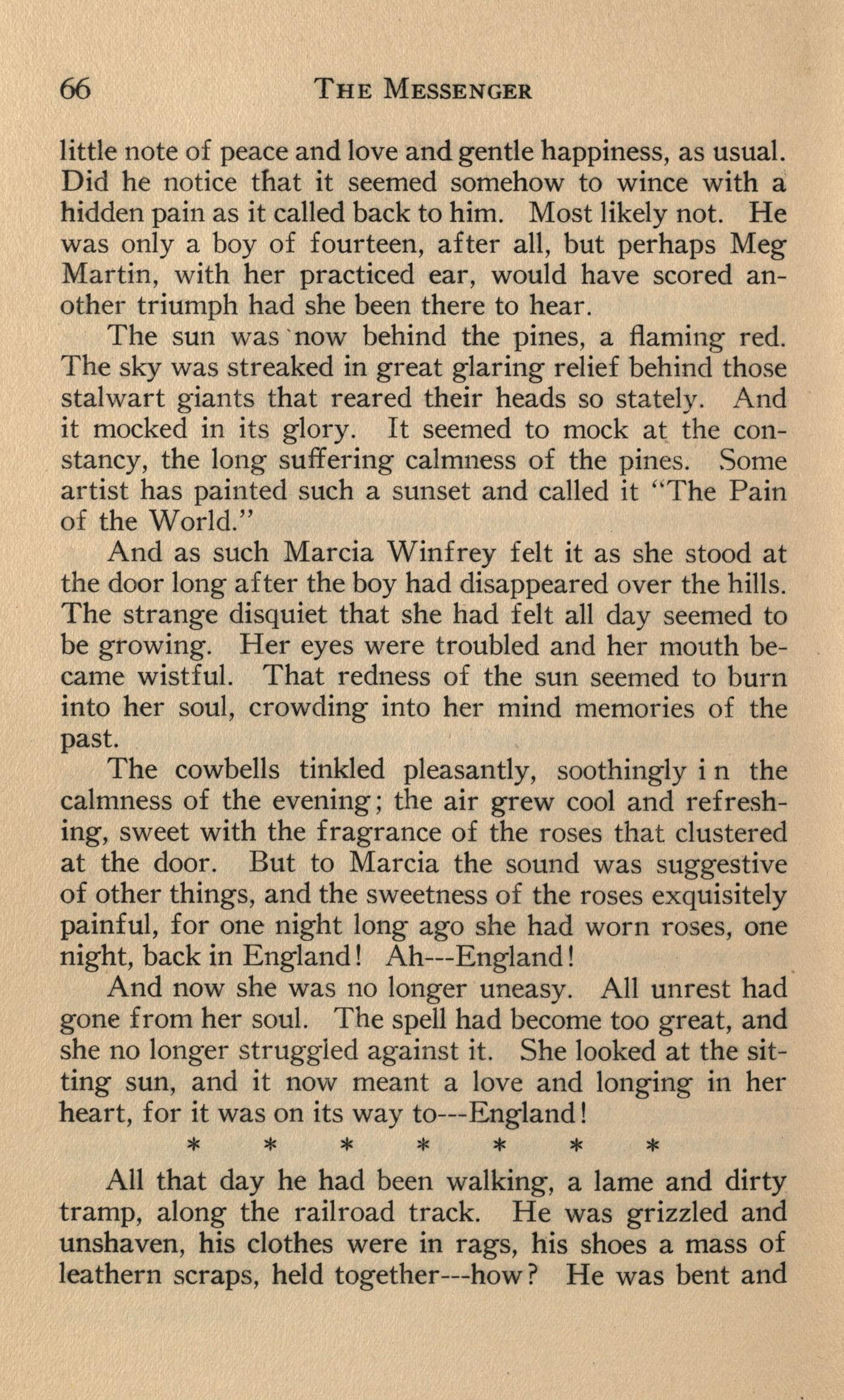
little note of peace and love and gentle happiness, as usual. Did he notice that it seemed somehow to wince with a hidden pain as it called back to him. Most likely not. He was only a boy of fourteen, after all, but perhaps Meg Martin, with her practiced ear, would have scored another triumph had she been there to hear.
The sun was ' now behind the pines, a flaming red. The sky was streaked in great glaring relief behind those stalwart giants that reared their heads so stately. And it mocked in its glory. It seemed to mock at the constancy, the long suffering calmness of the pines. Some artist has painted such a sunset and called it "The Pain of the World."
And as such Marcia Winfrey felt it as she stood at the door long after the boy had disappeared over the hills. The strange disquiet that she had felt all day seemed to be growing. Her eyes were troubled and her mouth became wistful. That redness of the sun seemed to burn into her soul, crowding into her mind memories of the past.
The cowbells tinkled pleasantly, soothingly i n the calmness of the evening; the air grew cool and refreshing, sweet with the fragrance of the roses that clustered at the door. But to Marcia the sound was suggestive of other things, and the sweetness of the roses exquisitely painful, for one night long ago she had worn roses, one night, back in England! Ah---England !
And now she was no longer uneasy. All unrest had gone from her soul. The spell had become too great, and she no longer struggled against it. She looked at the sitting sun, and it now meant a love and longing in her heart, for it was on its way to---England ! * * * * * * *
All that day he had been walking, a lame and dirty tramp, along the railroad track. He was grizzled and unshaven, his clothes were in rags, his shoes a mass of leathern scraps, held together---how? He was bent and

weak and he had been found lounging at one of Maryland's small railway stations and had been told to move on. So he had moved on, and on, and on, as would a dog. He knew not where he moved; he was no longer conscious of the fact that he was tired and hungry, that he was in need of shelter and rest. He only moved on because he had been told to. And because he had happened to face in the direction of the Green Spring Valley Farm he had moved that way---without knowing.
The woman was now at the piano. She had been drawn there unconsciously, irresistibly. For a moment her hands hovered over the keys, lovingly, lingeringly, then lightly brushed them with the grace of moonbeams, and a tender, infinitely beautiful melody, painful with its undertone of wistful yearning, floated sobbing, sobbing, into the stillness of the night.
And the tramp on the railroad track plodded on and on---ever nearer.
Then, as in a dream, she began to sing. Shining head uplifted, white throat throbbing in the moonlight, she sang, and the song was rich with a beauty of infinite sadness, a sadness of wist£ ul memories.
And o'er the tops of the pines the golden melody was wafted and a lame tramp passed unheeding, unheeding for a moment; then, his gaunt hollow face expressionless, as one who walks in his sleep, he retraced his steps and stood, silent in the night, with the heart song throbbing around him.
And Marcia sang on, no longer a woman, growing old and grey, in a plain little sitting room with roses clustering at the door. No, the roses were those at her breast. as young and beautiful, with the golden dreams of youth at their height in her heart, she stood before an audience
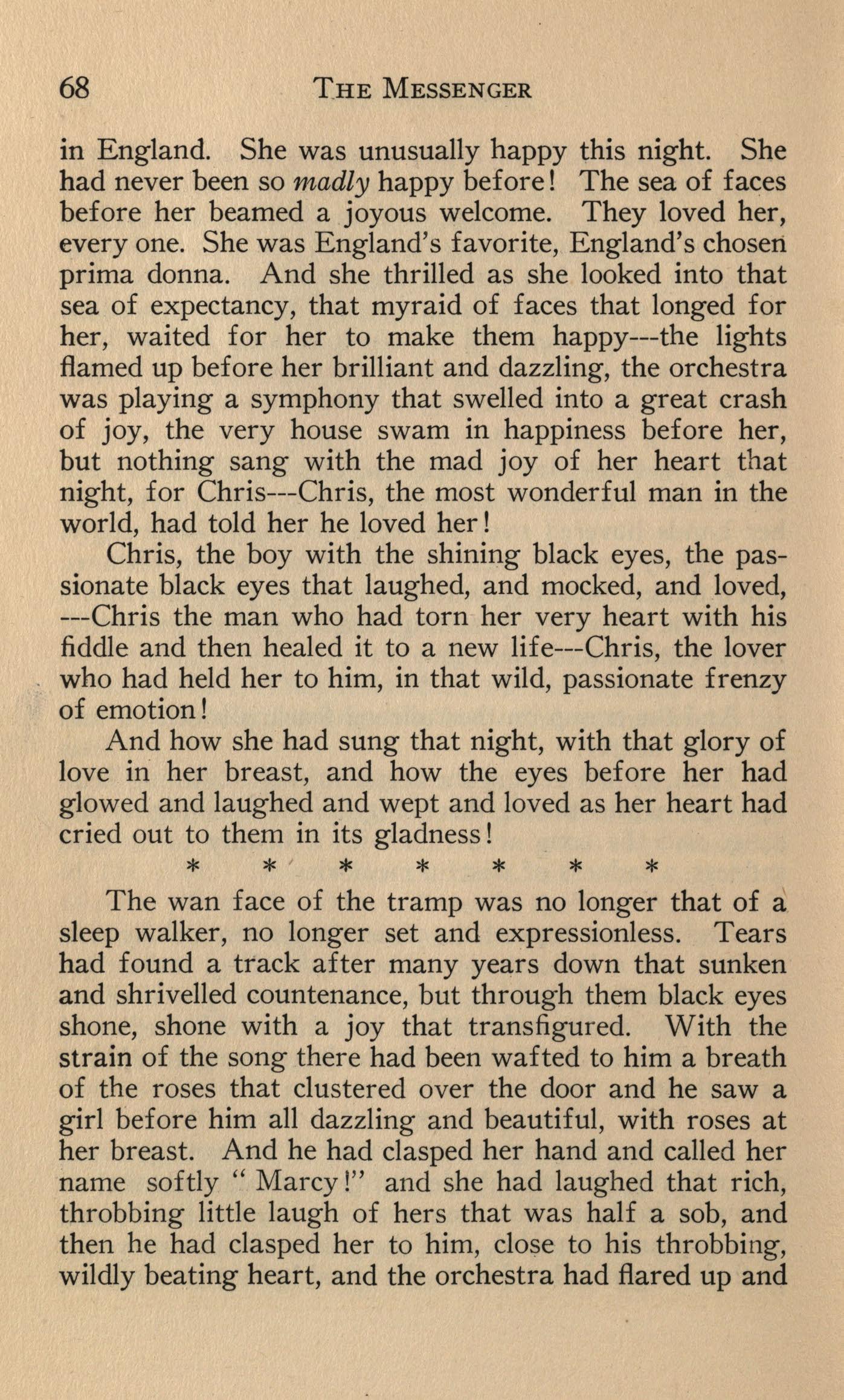
in England. She was unusually happy this night. She had never been so madly happy before! The sea of faces before her beamed a joyous welcome. They loved her, every one. She was England's favorite, England's chosen prima donna. And she thrilled as she looked into that sea of expectancy, that myraid of faces that longed for her, waited for her to make them happy---the lights flamed up before her brilliant and dazzling, the orchestra was playing a symphony that swelled into a great crash of joy, the very house swam in happiness before her, but nothing sang with the mad joy of her heart that night, for Chris---Chris, the most wonderful man in the world, had told her he loved her!
Chris, the boy with the shining black eyes, the passionate black eyes that laughed, and mocked, and loved, ---Chris the man who had torn her very heart with his fiddle and then healed it to a new lif e---Chris, the lover who had held her to him, in that wild, passionate frenzy of emotion!
And how she had sung that night, with that glory of love in her breast, and how the eyes before her had glowed and laughed and wept and loved as her heart had cried out to them in its gladness!
* * * * * * *
The wan face of the tramp was no longer that of a sleep walker, no longer set and expressionless. Tears had found a track after many years down that sunken and shrivelled countenance, but through them black eyes shone, shone with a joy that transfigured. With the strain of the song there had been wafted to him a breath of the roses that clustered over the door and he saw a girl before him all dazzling and beautiful, with roses at her breast. And he had clasped her hand and called her name softly " Marcy!" and she had laughed that rich, throbbing little laugh of hers that was half a sob, and then he had clasped her to him, close to his throbbing, wildly beating heart, and the orchestra had flared up and

played that song as they waited for her to sing. My God! the happiness of that night! How he had ·loved her! God! He had loved her! And the heavy note of a man's heart-broken sobs blended with the sweet wistfulness of a woman's song.
* * * * * * *
Marcia's voice had been golden, eager---full •of a triumph of happiness, as her heart went back to the glory of that night, and as it ended it was as if she had just ended that song fifteen years ago in England. She heard the applause, the hurrahs, as she left the stage, felt the glow of triumph in her heart---the triumph of her voice, of her art, ·and the triumph of the flame of love that burned in her breast.
Then, ah .then, -------- ! She had le£t the stage in a glow, expecting to find Chris waiting to ·welcome her, to congratulate her on her success. And when she had found no Chris, she had become wildly anxious. Was . he ill? Had anything happened? Yes it had! ·rt had! Why did every one look so anxious? "Where is he?" she had demanded. "You have no right to keep it from me! What has happened?"
And then, then they had told her. Forged a check! She had been hot with anger at them all; why, many a man had done wor se ! Why not help him, help him, poor Chris! He had done it for her!
And then---no, they had not finished their torture rack---another woman, and flight! Oh God! The shame, the hurt---the hurt of it! How crushed she had been in her bewilderment, the tumbling in of all her dreams, of all her life. Nothing was as she had thought it. From the happiest creature in the world she had become the lowliest, the poorest. She had nothing. Around her lay only the debris of her dreams---her dreams of love and -of the heart of a lover. And because she was so hurt and felt as though she could never again face an audience, could never again hold up her head in England, Winfrey,

Winfrey who had ever loved her; Winfrey, whom she had ever spurned, had come to her and offered to take her away, to a life of quiet and tender care. And because he was big and kind and tender and because she was hurt, so hurt---she had crept into his arms and come away with him. Her song had become low and sobbing, as that of a hurt animal, so low that the wretch on the railroad track could hear only its throbbing refrain . And he sobbed again, passionately, "God, I did love her. I did! Why did I do it! God forgive---forgive," and desperately, with a cry of pain, he was lost in the darkness of the night.
* * * * * * *
The song had passed slowly from one of pain into one of calm and peacefulness, and it finally died away with the lightness of the evening air, and Marcia stood again at the door as Winfrey and his son returned from "locking up."
"Why in the dark, Marcia?" asked her husband, kindly, gently.
She kissed him lightly on the forehead and answered quietly, peacefully, as she rubbed her shoulder up to his. "I was just wondering how the pines could keep so still, dear!"
,(Suggested and inspired by a poem of Robert W . Service , "Mus~ in the Bush ."> .